#Us Source Tourism Market
Explore tagged Tumblr posts
Text
USA Tourism Source Market Analysis Key Destinations and Tourist Profiles, 2023
The United States is one of the most significant source markets for global tourism, contributing millions of travelers to destinations worldwide each year. This article provides an in-depth analysis of the USA tourism source market, highlighting key trends, traveler preferences, and market dynamics that influence the flow of American tourists across the globe.
Market Overview
The USA tourism source market is diverse and dynamic, encompassing a wide range of travel motivations, from leisure and adventure to business and educational purposes. With a robust economy and a culture that values travel, Americans consistently rank among the top international travelers, impacting tourism economies around the world.
To Get a Snapshot of the US Source Tourism Report
Download a Free Report Sample
Key Drivers of Market Growth
Economic Stability and Disposable Income
The relatively stable economic conditions in the USA, coupled with high disposable income levels, have facilitated a strong propensity for international travel among Americans. The strength of the US dollar also plays a crucial role in making foreign travel more affordable for American tourists.
Cultural Interest and Travel Enthusiasm
Americans have a deep-seated enthusiasm for exploring different cultures and experiencing new environments. This cultural curiosity drives a substantial portion of international travel, with destinations offering rich historical, cultural, and natural attractions being particularly popular.
Advancements in Air Travel
Advancements in air travel, including increased flight connectivity and competitive pricing, have significantly contributed to the growth of the USA tourism source market. Major airlines and low-cost carriers have expanded their international routes, making global travel more accessible to a broader segment of the population.
Traveler Preferences and Trends
Popular Destinations
American travelers have a wide array of preferred destinations, with Europe, the Caribbean, and Asia being the most popular regions. Countries like Mexico, Canada, the United Kingdom, France, and Italy frequently top the list of destinations visited by American tourists.
Travel Seasons
Seasonality plays a significant role in the travel patterns of American tourists. The summer months, particularly from June to August, and the winter holiday season see the highest levels of outbound travel. Additionally, spring break and Thanksgiving are notable periods for increased travel activity.
Purpose of Travel
Leisure travel remains the dominant purpose for outbound trips, with a significant portion of travelers seeking relaxation, adventure, and cultural experiences. Business travel also constitutes a substantial segment, driven by the USA's strong economic ties with various countries. Educational and medical tourism are other growing segments within the market.
Market Challenges
Economic Uncertainty
Despite overall economic stability, periods of economic uncertainty, such as recessions or significant market fluctuations, can impact travel spending. Economic downturns can lead to reduced disposable income and a subsequent decline in international travel.
Political and Security Concerns
Political instability and security concerns in certain regions can deter American tourists from traveling to those destinations. Travel advisories and perceived risks play a crucial role in shaping destination choices and travel plans.
Health and Safety Regulations
The COVID-19 pandemic highlighted the importance of health and safety regulations in influencing travel behavior. Ongoing health concerns and varying international travel restrictions can pose challenges for the USA tourism source market.
Opportunities for Growth
Emerging Destinations
There is a growing interest among American travelers in exploring less conventional and emerging destinations. Countries in Eastern Europe, Southeast Asia, and Africa are becoming increasingly attractive due to their unique cultural experiences and relatively lower travel costs.
Sustainable Tourism
Sustainability is becoming a key consideration for American tourists. Destinations that prioritize eco-friendly practices, conservation efforts, and sustainable tourism initiatives are likely to attract environmentally conscious travelers.
Technological Innovations
Technological advancements are reshaping the travel industry, offering enhanced booking platforms, personalized travel experiences, and virtual reality tours. Leveraging technology to provide seamless travel experiences can drive growth in the USA tourism source market.
Future Outlook
The future of the USA tourism source market looks promising, with continued growth anticipated as travel becomes more accessible and affordable. Innovations in travel technology, increased focus on sustainable tourism, and the allure of new destinations will continue to drive market expansion. However, the market must remain adaptable to economic fluctuations, political changes, and health concerns.
Conclusion
The USA tourism source market plays a pivotal role in the global travel industry, contributing significantly to the economies of various destination countries. Understanding the key drivers, traveler preferences, and market challenges is essential for stakeholders looking to attract and cater to American tourists. As the market evolves, staying attuned to emerging trends and opportunities will be crucial for sustained success in the competitive landscape of international tourism.
0 notes
Text
Exploring America: Insights into the US Source Tourism Market
Tourism in the United States is not just about visiting landmarks and attractions; it's about experiencing the diverse cultures, landscapes, and adventures that this vast country has to offer. As one of the world's top destinations, the US tourism market is a dynamic and multifaceted industry that attracts millions of visitors from around the globe each year. In this exploration, we delve into the intricacies of the US source tourism market, uncovering insights, trends, and opportunities that define its landscape.
Understanding the Dynamics of US Source Tourism
Diversity of Travelers and Experiences
The US source tourism market encompasses a diverse array of travelers, each seeking unique experiences and adventures across the country. From solo adventurers and families on vacation to business travelers and cultural enthusiasts, visitors from the United States embark on journeys that span coastlines, mountains, cities, and beyond, immersing themselves in the rich tapestry of American history, culture, and natural wonders.
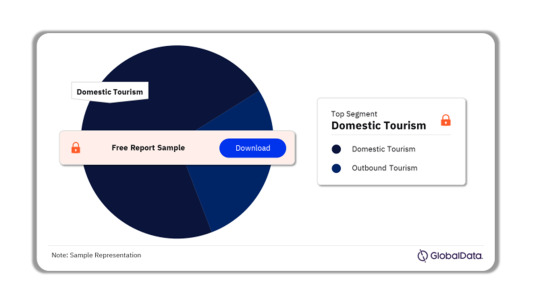
Buy the Full Report for more Insights into the US Source Tourism Market
Download a Free Report Sample
Driving Forces Behind US Source Tourism
Several factors drive US source tourism, including economic prosperity, technological advancements, and shifting travel preferences. As incomes rise and travel becomes more accessible, Americans are increasingly seeking out new destinations, immersive experiences, and authentic encounters that enrich their lives and broaden their perspectives, fueling growth and innovation in the US tourism industry.
Exploring Emerging Trends and Growth Drivers
Rise of Experiential Travel
Experiential travel is on the rise in the US source tourism market, with travelers prioritizing meaningful experiences and authentic interactions over traditional sightseeing. From culinary tours and outdoor adventures to cultural festivals and wellness retreats, Americans seek out immersive experiences that foster connections, inspire creativity, and create lasting memories, driving demand for unique and personalized travel experiences across the country.
Embrace of Sustainable and Responsible Tourism Practices
Sustainability and responsible tourism have emerged as key priorities for travelers and industry stakeholders alike in the US source tourism market. With increasing awareness of environmental conservation and community engagement, travelers seek out destinations and operators that prioritize sustainable practices, minimize environmental impact, and support local communities, driving a shift towards eco-friendly accommodations, low-impact activities, and community-based tourism initiatives.
Regional Insights and Market Dynamics
Coastal Escapes and Urban Adventures
Coastal destinations and urban centers remain popular among US source tourists, offering a diverse range of experiences and attractions for travelers of all interests and preferences. From the sunny beaches of California and Florida to the vibrant streets of New York City and Chicago, coastal escapes and urban adventures provide endless opportunities for exploration, entertainment, and cultural immersion, attracting visitors from across the country and around the world.
National Parks and Outdoor Recreation
The United States boasts an abundance of natural wonders and outdoor recreation opportunities that appeal to nature lovers and adventure seekers alike. From the majestic landscapes of Yellowstone and Grand Canyon National Parks to the scenic trails of Yosemite and Great Smoky Mountains National Parks, outdoor enthusiasts flock to these iconic destinations to hike, camp, and connect with nature, contributing to the sustainable growth and preservation of America's natural heritage.
Navigating Challenges and Seizing Opportunities
Addressing Infrastructure and Accessibility
As US source tourism continues to grow, infrastructure and accessibility emerge as critical considerations for destinations and industry stakeholders. Investing in transportation networks, accommodations, and visitor services is essential to enhancing the visitor experience, reducing congestion, and improving accessibility to remote and underserved destinations, ensuring that travelers can explore and enjoy the diverse landscapes and attractions that the United States has to offer.
Embracing Technology and Innovation
Technology and innovation play a pivotal role in shaping the future of US source tourism, driving efficiency, personalization, and sustainability across the travel journey. From mobile apps and digital platforms that enhance trip planning and navigation to virtual reality experiences and augmented reality tours that bring destinations to life, embracing technology enables destinations and operators to engage travelers, deliver memorable experiences, and stay competitive in a rapidly evolving tourism landscape.
Future Outlook and Strategic Imperatives
Fostering Collaboration and Stakeholder Engagement
The future of US source tourism hinges on collaboration and stakeholder engagement across the industry. By fostering partnerships among government agencies, industry associations, and community stakeholders, destinations can develop sustainable tourism strategies, mitigate overtourism, and promote responsible travel practices that preserve and protect America's natural and cultural heritage for future generations to enjoy.
Celebrating Diversity and Inclusivity
Inclusive and diverse tourism experiences are essential for ensuring that all travelers feel welcome and represented in the US source tourism market. By embracing cultural diversity, promoting inclusive tourism initiatives, and amplifying underrepresented voices and experiences, destinations can create authentic and enriching experiences that celebrate the richness and diversity of American culture, heritage, and landscapes.
In conclusion, the US source tourism market is a dynamic and vibrant industry that offers a wealth of experiences and opportunities for travelers to explore and discover the beauty and diversity of America's landscapes, cultures, and communities. By understanding market dynamics, embracing emerging trends, and fostering collaboration and innovation, stakeholders can shape the future of US source tourism and create memorable experiences that inspire, educate, and enrich the lives of travelers from around the world.
0 notes
Text
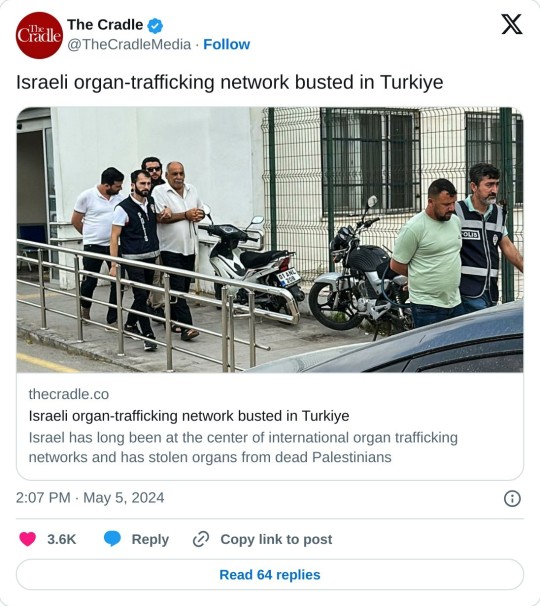
Police in the Turkish city of Adana detained 11 suspects, five Israeli and two Syrian, on allegations of organ trafficking, the Daily Sabah reported on 5 May. The Provincial Directorate of Security's Anti-Smuggling and Border Gates Branch began investigating after examining the passports of seven individuals who arrived in Adana from Israel about a month ago by plane for the purpose of health tourism. The two Syrian nationals, ages 20 and 21, were found to have fake passports. Further investigation revealed that Syrian nationals had each agreed to sell one of their own kidneys to two of the Israeli nationals, ages 68 and 28, for kidney transplants in Adana. During searches at the suspects' residences, $65,000 and numerous fake passports were seized. Israel has long been at the center of what Bloomberg described in 2011 as a “sprawling global black market in organs where brokers use deception, violence, and coercion to buy kidneys from impoverished people, mainly in underdeveloped countries, and then sell them to critically ill patients in more-affluent nations.” The financial newspaper added, “Many of the black-market kidneys harvested by these gangs are destined for people who live in Israel.” The organ-trafficking network extends from former Soviet Republics such as Azerbaijan, Belarus, Ukraine, and Moldova to Brazil, the Philippines, South Africa, and beyond, the Bloomberg investigation showed. Accusations of Israeli involvement in organ trafficking also apply to the occupied Palestinian territories. In 2009, Sweden's largest daily newspaper, Aftonbladet, reported testimony that the Israeli army was kidnapping and murdering Palestinians to harvest their organs. The report quotes Palestinian claims that young men from the occupied West Bank and Gaza Strip had been seized by the Israeli army, and their bodies returned to the families with missing organs. "'Our sons are used as involuntary organ donors,' relatives of Khaled from Nablus said to me, as did the mother of Raed from Jenin as well as the uncles of Machmod and Nafes from Gaza, who all had disappeared for a few days and returned by night, dead and autopsied," wrote Donald Bostrom, the author of the report.Bostrom also cites an incident of alleged organ theft during the the first Palestinian intifada in 1992. He says that the Israeli army abducted a young man known for throwing stones at Israeli troops in the Nablus area. The young man was shot in the chest, both legs, and the stomach before being taken to a military helicopter, which transported him to an unknown location. Five nights later, Bostrom said, the young man's body was returned, wrapped in green hospital sheets. Israel’s Channel 2 TV reported that in the 1990s, specialists at Abu Kabir Forensic Medicine Institute harvested skin, corneas, heart valves, and bones from the bodies of Israeli soldiers, Israeli citizens, Palestinians, and foreign workers without permission from relatives. The Israeli military confirmed that the practice took place, but claimed, "This activity ended a decade ago and does not happen any longer." Israel’s assault on Gaza since 7 October has provided further opportunities for the theft and harvesting of Palestinians’ organs. On 30 January, WAFA news agency reported that the Israeli army returned the bodies of 100 Palestinian civilians it had stolen from hospitals and cemeteries in various areas in Gaza. According to medical sources, inspection of some of the bodies showed that organs were missing from some of them. On 18 January, the Times of Israel reported that the Israeli army confirmed reports that its soldiers dug up graves in a Gaza cemetery, claiming its soldiers were trying to “confirm that the bodies of hostages were not buried there.”
#yemen#jerusalem#tel aviv#current events#palestine#free palestine#gaza#free gaza#news on gaza#palestine news#news update#war news#war on gaza#human rights#war crimes#gaza genocide#genocide
6K notes
·
View notes
Text
Trump and Musk Are Pushing the U.S. Toward a Shutdown—Here’s What That Means for You
Once again, the U.S. is on the brink of a government shutdown. But this time, it’s not just political infighting—tech billionaire Elon Musk is playing a role, too. By leveraging his influence and platform, Musk has joined forces with Donald Trump to push for chaos, blocking a budget plan that would keep the government running.
What’s Happening?
A government shutdown occurs when Congress fails to pass a budget. Without funding, federal agencies shut down, leaving millions of workers unpaid and essential services suspended. Trump has been pressuring Republicans to reject the current spending plan, while Musk has amplified right-wing voices that oppose it, turning a routine budget negotiation into a high-stakes political crisis.
How This Affects You
A government shutdown doesn’t just impact politicians—it hits everyday Americans hard. Here’s what you need to know:
Federal Workers & Military Personnel: Over 4 million federal employees, including service members, could be forced to work without pay or be furloughed entirely. Many live paycheck to paycheck and would struggle to cover rent, utilities, or groceries.
Social Security & Medicare: While benefits continue, customer service lines and claims processing could be severely delayed, making it harder for seniors and disabled individuals to access their payments or healthcare services.
Food Assistance Programs: Families relying on the Supplemental Nutrition Assistance Program (SNAP) could see delays in benefits, and funding for food banks may dry up, exacerbating food insecurity.
National Parks, Museums, and Public Services: Expect closures of national parks, Smithsonian museums, and other federally funded sites. This affects not only visitors but also the small businesses that rely on tourism revenue.
Air Travel Disruptions: TSA agents and air traffic controllers will be required to work without pay, increasing the risk of flight delays and staff shortages that could create chaos at airports.
Housing & Small Business Loans: FHA-backed home loans could be delayed, making it harder for people to buy homes. Small businesses relying on federal grants or loans may also face significant funding gaps.
Economic Instability: The uncertainty and disruption from a shutdown can rattle financial markets, leading to job losses, increased inflation, and setbacks for businesses large and small.
Why Are Trump and Musk Doing This?
The Democrats argue that the budget proposal favored by Trump is nothing more than a disguised tax cut that would primarily benefit the ultra-wealthy—people like Musk. Additionally, they refuse to support a plan that would burden the U.S. with trillions of dollars in additional debt. Notably, alongside the Democrats, 38 Republican members of Congress also voted against Trump’s proposal.
The Bigger Picture
This isn’t just a budget dispute. It’s an alarming sign of how billionaires and political extremists can manipulate the system for their own gain. When an unelected tech mogul like Musk and a former president under multiple indictments can grind the government to a halt, it raises serious concerns about power, accountability, and the future of democracy.
What Can You Do?
Stay informed and share credible news sources.
Contact your representatives and demand they stand up to political obstruction.
Support journalism that holds those in power accountable.
Most importantly: Vote. A government shutdown is a preview of the dysfunction that could become permanent if Trump and his allies regain full control.
This is bigger than one political battle—it’s a fight for the stability of the country. And the outcome depends on all of us.
Source:
https://www.reuters.com/world/us/us-senate-democrats-debate-path-forward-government-funding-bill-2025-03-12/
#president trump#trump is a threat to democracy#us politics#elon musk#white house#usa news#donald trump#government shutdown#shutdown#american politics#politics#usa politics#political#us government#trump administration#economy#washington
141 notes
·
View notes
Text
Thought this was a very straightforward summary of what is right on the tin - how is Cuban agriculture so bad? And it is bad, well below its peers and where it could be given its inherent assets. It is of course a story of regime incompetence, but what is revealing is that it was always a mess. Most communist countries had a phase we can describe as "revolutionary incompetence" - when they first come to power, they believe their own hype and think the Spirit of the People can substitute for fertilizer and proper incentives. They try it, it crashes, and then at some point they wake up and the technocrats take power and partially right the ship. This happened in some form in Cuba, but only marginally - throughout the Cold War Cuba was essentially propped up by subsidies and forced markets via the Soviet Union, and the problems of the system were left to wither on the vine (zing). After the Cold War, forces like rapid urbanization made reforms harder to pursue, and things like revenue from the tourism industry and handouts from Venezuela continued to allow the state to push the problem off. Cuba is definitely in another of its periodic crises, but those didn't really dislodge things in the past.
The article does spend a bit too much time going "no, the US trade ban isn't a major cause of anything", which is understandable but like everyone already knows that so it is a bit annoying. Otherwise it is very well written.
Honestly makes you think that the worst thing that ever happened to Cuban Communism was that none of those CIA assassinations of Fidel ever hit the mark. The deaths of Mao & Stalin were absolutely what allowed China & the USSR to enter their more reasonable phases; Cuba just never got the same opportunity because that damn founder clinged to power for so long. Who knows ofc, but does seem ironic!
62 notes
·
View notes
Text
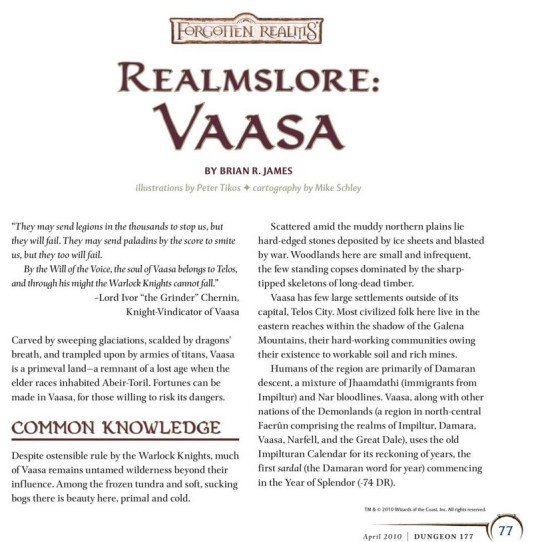
*wheeze*
Much of Vaasa remains untamed wilderness...
There is some sort of a Forgotten Realms fantasy area called Vaasa. @_@
Someone needs to tell the City of Vaasa, they can use this in their tourism marketing. Get the hashtag VisitVaasa trending among nerds.
Source.
80 notes
·
View notes
Text
The way some people straight up deny soft criticism of the BL industry (stuff that isn't even a secret if you don't close your eyes and ears!!!) Criticism by literally LGBTq people working in said BL industry in Thailand..... basically one of the only ones who's voice are most valid here in this discourse. That's not hypocrism of people working in the industry to open their mouth! That's called self-awareness and using this genre to convey a message and trying to fix issues. This is about Step by Step and Lovely Writer atm. But those are not the only dramas who brought up some critic but somehow people get salty now about that little poke from SbS? Did you sleep the past 3 years?? And it's not a coincident that it's always the same topics certain BL dramas brought up!
I feel like some people here don't get that you can criticize your own work place, your own industry, your own country WITHOUT hating, shaming or demonizing it completely! Yall need stop this black & white thinking and the constant urge to feel personally attacked by something like this...
Especially the message of LW (the same people who make SbS now) was that there is nothing wrong about loving BL stories and they do like producing them. BUT that there are some things in the industry that are bad and harmful NOT ALL OF IT, SOME THINGS! Like the treatment of actors and certain topics by companies and producers. And the main theme of LW: the toxic overstepping and overcontrolling shipping culture that can (and did) destroy real life relationships / friendships under the weight of the pretend relationship (pretend as in they are not dating for real (everyone knows that! or should know that! this is also not even a secret if you watch interviews outside of the fun and couple game shows) at least in most of the cases.... in some rare ones yes, in some very rare cases some actors actually date but they are too afraid to come out due to homophobia and the way the industry & fandom treats those cases (source Dr. Thomas Baudinette who studies the industry as a form of queer asian media and interviewed companies and actors since years... somewhere in this he talks about actor relationships, I can't find the time stamp atm))
ALSO the point about exploiting the LGBTq community is NOT about the fans or LGBTq audience who love these dramas. But about businesses and literal Thailand itself. For using those stories and actors / couples for advertising, for marketing, for tourism even. BUT at the same time some don't care for real life LGBTq issues and rights or the fact that Thailand is still not agreeing on equal marriage (which is not just about them not being able to marry but they get denied a lot of things married couples get. alone the fact that they can't see their partner in the case of an emergency in the hospital because 'they are not family'). In the said SbS scene they were literally discussing which pretend couple has the most fans and how they could use their fandom and fan clubs to gain profit. Don't you guys get how fucking frustrating this is for the LGBTq people and allies who work in the BL industry, to get paraded in front of the camera for money and image but still don't get treated equally??? THAT is what they mean with exploiting.... And it's a lot of producers, writers and some actors who voice those points, not just these few self-aware BL dramas. But doing it through the medium they adress is the best way to reach the right people, to make the right people aware and ask for their support. Since they can't say such things directly (even though they should) unless they want to lose their job, they still like to a degree.
And I am sorry but the opinion of actual thai people who are inside that industry is more valid than some random fan who just doesn't want to understand those things in order to enjoy their shows without feeling bad.... What if I tell you that you can do both and that this is not about shaming you or making you feel guilty (unless you participate in toxic overstepping behavior or are actually LGBTq-phobic, then yes feel guilty)! Acknowledging issues, supporting to fix those issues and still have fun with these dramas and actors.... Those things can and do coexist and nobody said otherwise!!
#damn i said i stay away from discourse and I am not here to discuss but I have to say something about this since I saw some bs#sorry my patience is very thin the past months and I am so damn tired of stupid discourse#rant#bl drama#bl actors#step by step the series#Tee Bundit Sintanaparadee#tee bundit#salt post
495 notes
·
View notes
Note
It could be interesting to have affordable 'healthy' alternatives to cheaper food, like if one is frozen pizza and the other is fresh fish and quinoa, the middle could be fried rice with frozen shrimp or something like that. Canned foods are an option too— they are not 'healthy' healthy but they aren't unhealthy either: I think most people just fear them due to preservation methods taken like high sodium levels since salt is a preservative but can be bad for you if consumed a lot.
Plus, you can bulk buy rice and dried pasta and keep it safe without worrying about going bad (just has to be careful with critters). It's a good source of food.
AND MC can grow some stuff by themselves like herbs, and some veggies don't require much attention and can grow on their own, like potatoes and zucchini and other root vegetables. It does depend on your garden's health and the weather conditions though, information I have zero clue about within the story. I can also imagine it being difficult for a housespouse with a sickly child who appears to take care of the house themselves (unless A is mentioned to help out with cleaning and such and I just missed that).
MC can be shrewd and have haggling skills too, if this city has markets (NOT supermarkets)— I don't know how common those are in the US though, because we have open-air markets that open at certain places at certain days, but they are NOT farmer's market since these independent sellers get their veggies and fruits from wholesale markets and determine prices themselves instead of growing them themselves.
Or for example, if Ridgepoint is a coastal city/town, that can reduce the price of fish since economy would very likely include fishing, so MC could rely on local seafood options. Cheap to the locals at the local fish market, but expensive in restaurants catering to the tourists, as I imagine Ridgepoint to be quite the tourism hotspot due to its casinos and the fact you mentioned tourists being among MC-14's unlucky victims.
You make some good points, but for coding reasons, I decided to keep it simple with healthy and not-so-healthy options. If it helps, MCs with the gardening hobby can have their own garden, and you’ll even get to choose what they primarily grow. You actually just gave me an idea that growing produce could lower the MC’s grocery bill! Thanks, that'll be cool to implement.
24 notes
·
View notes
Note
OMG! I can practically see her pulling at her pearls in indignation and fury! I wonder how many wet dreams he rejected her to result in this anger 🙃🙄😜 https://www.tumblr.com/maximumwobblerbanditdonut/747779411400671232/public-intoxication-sh-was-invited-to-the-landcon?source=share
Dear Pearl Clutching Anon,
This woman is the worst mythomaniac and the most pathetic know-it-all of the entire fandom. Mark me: probably a sock account of one of the Mordor sopranos, who'd like to play it cool otherwise. She is an impostor, pretending to be a Scot. But her grammar and spelling recurrent mistakes point to anything else but an English native speaker.
Prized and praised as she is by the dim-witted, she is living proof of the fact that you cannot reasonably and endlessly pretend to be an expert in hair implants, cocktails/bartending, audiovisual production, copyright, alcohol sales and pretty much everything in between. To me, she is at her most pathetic when she pretends to analyze the legal intricacies of the French regulations applicable to public alcohol tasting events.
What happened, in fact, at the Landcon 6 whisky tasting?
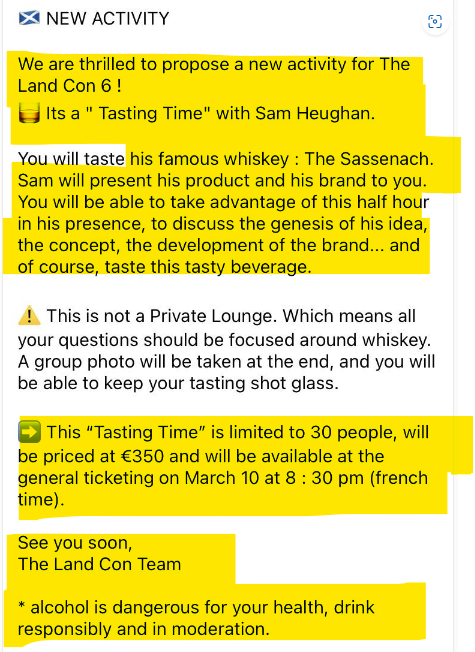
Ok. So, this was announced by the French organizers on March 5th and presented as a limited audience event, priced at 350 euros.
This idiot's comment is absolutely priceless:
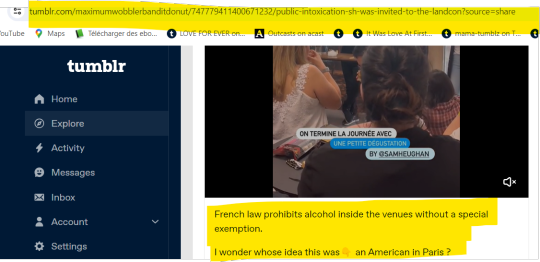
She would be surprised to find out that, unlike the US, there has never been any Prohibition decreed in France (Hell would have frozen). Even more interestingly, the only venues where French law specifically prohibits alcohol tastings and sales are enumerated very clearly in regulations far above her intellectual abilities:
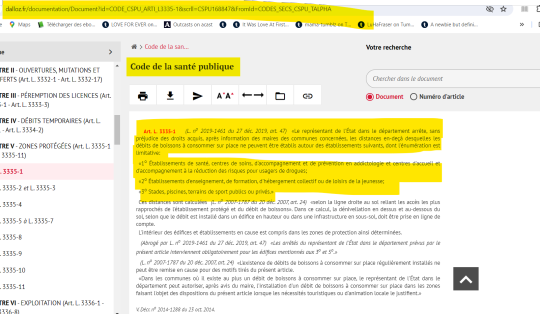
The main idea is that you cannot sell/organize alcohol tastings in public health venues (hospitals, clinics, etc), rehabilitation clinics (d'oh!) - both for alcohol and drug addictions -, schools, youth summer camps, sports arenas, swimming pools or any other public or private sports venues.
(Source: French Public Health Code, https://www.dalloz.fr/documentation/Document?id=CODE_CSPU_ARTI_D3335-1&scrll=CSPU022225&FromId=CODES_SECS_CSPU_TALPHA)
To these limitations, the French national professional organizations add, as best practice, the following: churches, cemeteries, prisons, military barracks, railway/public transport facilities (including depots).

(Source: Vin & Société's Guide juridique de la dégustation/Tasting Legal Guide - https://www.syndicat-cotesdurhone.com/upload/article/file/202103guidejuridiquedeladegustation-60658bb9468b4.pdf)
To my knowledge, Landcon's venue was neither a cemetery, nor a church (the latter could be, however discussed: wee & lame joke, btw). And for that poor woman's information, you would not need an exemption, but a permit, or licence. In current French law, there are four such sale permits, ranked from I (soft drinks, such as Orangina) to IV (all drinks, including spirits). The fabled Licence IV (also the name of a beloved 90s French kitschy music group, LOL) is now impossible to obtain and if you want to have one, you have to buy the venue (cafe, nightclub, bar, bistro, restaurant or buvette) that had it issued first, many moons ago.
That problem solved, we would have to further analyze the type of event hosted by the Landcon. Was it a tasting or a sale, according to French regulations?
If it was a tasting, no licence is needed. If it was a sale, you might need a temporary licence, granted by the Mayor, provided you have notified them at least 3 months before the event. These are also famously hard to get and very sparingly granted, too.
Because tastings are an exception, they are strictly defined by French regulations as 'free alcohol consumption' and their regulations are excruciatingly detailed. Procedures and limitations vary according to the type of event: sports, tourism promotion, markets and fairs, public gatherings or cultural events (which is the one that seemed the closest to our situation). But a cultural event-cum-tasting would have to be completely free of charge (no paying access tickets), in order to be exempt from any legal obligation. This was not the case, as we know there was a rather steep, 350 euros fee, to be able to attend it:
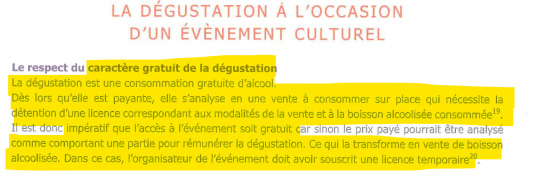
(Source: Vin & Société's Guide juridique de la dégustation/Tasting Legal Guide - https://www.syndicat-cotesdurhone.com/upload/article/file/202103guidejuridiquedeladegustation-60658bb9468b4.pdf)
That new activity was certainly not a tasting, as defined by French law. An amateur could then conclude, that S's event was, in fact, a disguised sale and that he is either a sinister fool or a filthy conman.
The trouble is, French legislation tolerates one single, overruling exception to everything I wrote above: sale by the producer of said alcohol. It is to be found (or rather interpreted - and it has been so by myself AND the French professional organizations), in the Code Général des Impôts/ French Tax Code:
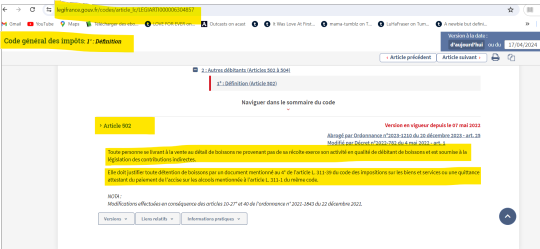
To avoid a tedious legal translation, the idea is that if you do not sell your own produced booze, you are automatically considered as a stockist/trader and as such, subject to alcohol sales' regulations. If the Landcon organizers would have sold/promoted Laphroaig, for example, they would have needed the permit. But hosting a paying tasting event organized by SRH, promoting SRH's whisky and which profits entirely belonged to SRH is a sale by the producer, as defined by French law, not needing a permit:
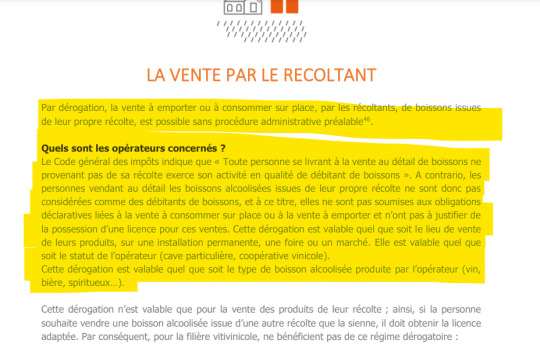
(Source: Vin & Société's Guide juridique de la vente/Sales Legal Guide - https://fgvb.fr/wp-content/uploads/2021/04/Vin-et-Societe-Guide-juridique-de-la-vente-19042021.pdf)
So: even if the tasting event was, in fact, a sale, French law allows a producer to sell his own alcohol, for promotion purposes as a side event, with no further need to obtain a permit. And this is exactly what their legal team rightfully advised them to do and completely what I would advised them to do, too.
That woman is so often and in so many ways completely wrong, that she is absolutely ridiculous. She (and also her other Big Friend) should perhaps stop pretending to be whatever they are not. Infantilizing, bullying and snarling at people does not help with their credibility.
Such women are genuine Frauds and absolutely despicable. People spend years fucking their eyesight in law school and we do not joke about interpreting and reading legalese. Ever. But to see idiots pretending to know just because they fucking used Google for ten minutes is just infuriating: it took me two hours to find the exception and another two to write this comment.
I hope this long, tedious answer was helpful, Anon.

78 notes
·
View notes
Text
nirin province | northern
------------------------------------------------------------------------------
date: February 7, 2025. this may be longer. sorry.
------------------------------------------------------------------------------
The Northern Desert, Nirin
*ೃ༄Nirin
ೃ⁀➷Capital Cities: Waterlight City
ೃ⁀➷Unique Features: Located in the northern desert, Nirin features stunning landscapes with rugged mountains and vibrant canyons. Waterlight City, its capital, is famous for its flourishing flora, supported by the canyon's rich soils. Located in the northern desert, Nirin is known for stunning landscapes and rugged mountains. Waterlight City, famous for its thriving flora, showcases how the canyon's rich soils support diverse ecosystems. The Higher Families of Solon and Iktomi are prominent here.
.ೃ࿐Economy
*ೃ༄Military
ೃ⁀➷Military Training and Defense:
One of the primary pillars of Nirin’s economy is its military sector. The province is home to a major military base that plays a key role in national defense and military training. Nirin’s rugged desert terrain and canyon landscapes provide an ideal setting for training exercises, making it a vital location for the country’s military operations.
ೃ⁀➷Military Training:
Nirin’s military facilities focus on preparing soldiers for a variety of environments, with training exercises conducted in the desert, canyon, and mountainous regions. The province’s natural features allow for simulations of different combat scenarios, making it a strategic asset for military readiness.
*ೃ༄Resource Extraction
Nirin’s mineral wealth is a significant driver of its economy. The region is known for its abundant mineral deposits, including precious metals like gold, silver, and copper, as well as valuable gems. These resources are extracted through mining operations that contribute to both the local and national economy.
ೃ⁀➷Trade of Precious Metals and Gems:
Nirin’s rich deposits of gems and precious metals are highly sought after in global markets. The trade of these resources is an important source of income for the province, with exports contributing significantly to its economic growth.
ೃ⁀➷Mining Industry:
The mining sector in Nirin is highly developed, with large-scale operations extracting minerals from the rugged mountains and desert areas. These minerals are used for a variety of purposes, including military applications, trade, and manufacturing.
*ೃ༄Eco-Tourism
In addition to its military and resource extraction sectors, eco-tourism plays a vital role in Nirin’s economy. The province’s stunning natural landscapes, including the vast deserts, rugged canyons, and diverse ecosystems, attract visitors from around the world. Eco-tourism in Nirin focuses on sustainable travel experiences that highlight the region’s natural beauty and cultural heritage.
ೃ⁀➷Hanging Crescent Arena,
where non-lethal duels are held. These duels are a major cultural and sporting event in Nirin, drawing spectators from across the world. Tourists visit the arena not only to watch the duels but also to learn about the region’s martial arts traditions and cultural practices.
ೃ⁀➷Desert and Canyon Tours:
The unique desert and canyon landscapes of Nirin are a major draw for eco-tourism. Visitors can participate in guided desert hikes, exploring the vast, open desert under the stars, or embark on canyon tours to experience the beauty of the canyon ecosystems. These tours provide educational opportunities about the local flora and fauna, as well as the history and culture of the region.
ೃ⁀➷Cultural Festivals and Events:
Festivals like Tssrra and Iktoia also attract eco-tourists, offering a chance to experience Nirin’s rich cultural traditions while exploring the natural environment. These events are celebrated with outdoor activities, art displays, and community gatherings, providing a unique and immersive experience for visitors.
*ೃ༄Agriculture and Sustainability
Despite its desert climate, Nirin’s canyon areas benefit from microclimates that support agricultural activities. Agriculture plays a smaller but still significant role in the economy, particularly in the production of desert-adapted crops. These crops are cultivated using sustainable practices that conserve water and protect the environment.
ೃ⁀➷Desert Agriculture:
Farmers in Nirin use innovative techniques to grow crops in the arid desert, focusing on drought-resistant plants and sustainable irrigation methods. The fertile canyon areas are key to this agricultural success, providing a natural environment for growing a variety of crops.
ೃ⁀➷Military Training and Defense:
Due to the scarcity of water in the desert, Nirin has developed advanced water conservation systems. These systems are essential for supporting both agriculture and the daily needs of the population, ensuring that water resources are used efficiently. In waterlight city, the lake gives the water needed
*ೃ༄Trade and Commerce
Nirin’s economy is also supported by its role as a trade hub for precious resources and eco-tourism. The province’s location and resources make it an important player in both regional and global markets.
ೃ⁀➷Trade of Resources:
Nirin exports its minerals, gems, and agricultural products to other regions, contributing to the national economy. The demand for these resources in global markets ensures a steady flow of trade and income.
ೃ⁀➷Local Crafts and Art
Nirin’s residents also engage in the production of handcrafted goods and art made from local materials, such as sand, stone, and desert plants. These items are sold in markets and artisan shops, contributing to the local economy and attracting tourists interested in unique cultural products. Clothes are also made
.ೃ࿐Climate
*ೃ༄Climate
Nirin's climate is primarily desert, characterized by hot, dry summers and mild winters. The desert terrain around Nirin is arid, with high temperatures during the day and cooler nights. However, the canyon areas—especially around Waterlight City—benefit from microclimates, creating pockets of more temperate conditions that support a wider range of life. These microclimates allow for the growth of plants and agriculture that would otherwise be impossible in the surrounding desert.
ೃ⁀➷Desert Climate:
The majority of Nirin's landscape is a desert, with vast stretches of sand dunes, rocky terrain, and rugged mountains. Rainfall is sparse, and the land can be harsh, with intense heat during the summer months and cooler, more temperate conditions in the winter. The absence of consistent rainfall makes water a precious resource, and the people of Nirin have adapted by developing advanced water conservation methods. Outside of these microclimates, the landscape of Nirin is dominated by rugged mountains, vast sand dunes, and the expansive desert itself, which remains harsh and unforgiving. The desert areas surrounding Waterlight City are arid, with minimal plant life and little natural water sources, except for the few oasis pockets sustained by underground springs.
ೃ⁀➷Microclimates in the Canyons:
The canyons, especially around Waterlight City, create natural microclimates that allow for the cultivation of desert-adapted plants and even more lush vegetation in certain areas. These microclimates are formed by the unique geography of the region—canyon walls provide shelter from the harsh desert winds and create pockets of moisture, allowing for agriculture to thrive in an otherwise arid environment. Despite the harsh desert environment, Waterlight City and other areas within the canyons benefit from microclimates that allow for the flourishing of vegetation. These areas experience cooler temperatures in the summer and more stable conditions due to the natural protection provided by the canyon walls. The canyon's unique geography supports more diverse ecosystems compared to the surrounding desert, creating conditions favorable for agriculture and the cultivation of desert-adapted plants. These microclimates make the region an important agricultural hub within Nirin, especially for crops and plants that would otherwise struggle to survive in the surrounding arid landscape.
ೃ⁀➷Hot, Dry Summers:
The summer months in Nirin are extremely hot, with temperatures soaring during the day. The desert landscape is arid, and rainfall is scarce, making water resources vital for survival.
ೃ⁀➷Mild Winters:
Winters in Nirin are relatively mild compared to the summer heat. While the temperature can drop at night, daytime temperatures remain moderate, making the climate more tolerable for residents and visitors.
*ೃ༄Key Resources
Rich in minerals, including precious metals and gems. The province also has abundant resources for military training, and its fertile canyon areas support agriculture, particularly in the cultivation of desert-adapted plants.
ೃ⁀➷Minerals:
The region is known for its rich deposits of precious metals and gems, which are mined from the rugged mountains and desert landscapes. These resources play a major role in Nirin’s economy, with mining operations being a key industry in the province.
ೃ⁀➷Military Resources:
Nirin’s strategic location and terrain make it ideal for military training. The province is home to one of the major military bases, and its landscape provides a natural setting for training exercises. The combination of rugged desert terrain and diverse ecosystems makes Nirin an ideal place for military operations, with the province’s resources supporting defense and training activities.
ೃ⁀➷Agricultural Resources:
Despite the surrounding desert, the fertile canyon areas of Nirin support agriculture. These microclimates allow for the cultivation of desert-adapted plants, such as hardy grains, fruits, and vegetables. Agriculture is an important part of the local economy, providing sustenance for the population and contributing to trade.
*ೃ༄Flora
ೃ⁀➷Desert Flora:
In the arid desert areas, plants must be hardy and able to survive extreme heat and limited water. Common desert plants include cacti, succulents, and desert grasses. These plants have adapted to store water and withstand harsh conditions.
ೃ⁀➷Canyon Flora:
The microclimates in the canyon areas allow for a greater variety of plant life. Trees and shrubs are more common in these areas, and the fertile soil supports the growth of plants that require more water than those found in the desert. These plants include desert-adapted species like mesquite, sagebrush, and willows that thrive in the more temperate conditions of the canyons.
*ೃ༄Fauna
ೃ⁀➷Lizards:
Various species of lizards are common in the desert, many of which have evolved to blend into the sandy environment to avoid predators and conserve moisture.
ೃ⁀➷Desert and Canyon Horses:
Desert horses and canyon horses are bred to withstand the harsh conditions. These horses are known for their endurance and adaptability to the arid desert terrain, often used for transportation and military purposes.
ೃ⁀➷Camels:
Camels are another key species found in Nirin, capable of traveling long distances without water, making them indispensable in the desert areas for trade, transportation, and military use.
ೃ⁀➷Desert Foxes:
Desert foxes are well-adapted to the arid landscape, with large ears that help regulate body temperature and a keen sense of hearing to locate prey.
ೃ⁀➷Bird Species:
The canyon environment supports a variety of bird species, including eagles, hawks, and owls, which are skilled hunters in the desert. Their presence also adds to the beauty of the natural surroundings, making them an important symbol in local culture.
*ೃ༄Cuisine
ೃ⁀➷Regional Dishes:
In Nirin, the cuisine is shaped by the challenging desert environment. Nirin Stew, a hearty, spiced meat and vegetable dish, is the region’s standout dish. Cactus salad, made from locally sourced desert plants, is a staple, while floral teas from the city of Waterlight are celebrated for their unique, refreshing qualities. The emphasis on grilled meats and spicy foods is a reflection of the region’s rugged spirit, with southern American-style dishes also being popular, like grilled game meats and cornbread. The food in Nirin mirrors the Southern American style, with grilled meats, spices, and robust flavors.
ೃ⁀➷Street Food:
In the urban areas of Waterlight City, street food is a vibrant part of the culture. Food carts and small vendors offer quick bites such as spiced meat skewers, cactus-filled tortillas, and small flatbreads topped with savory herbs and cheeses. These foods are perfect for busy locals and tourists alike, offering a taste of Nirin’s rich culinary traditions.
ೃ⁀➷Spicy Salsas and Dips:
In keeping with the region’s love for bold flavors, Nirin features a variety of spicy salsas and dips. These are often made from roasted tomatoes, peppers, and onions, with a heavy use of chili and local spices. They are served alongside grilled meats, tacos, or flatbreads.
ೃ⁀➷Nirin Stew:
A standout dish, Nirin Stew is a rich, spiced meat and vegetable dish. It often includes tender cuts of lamb, goat, or game meats, simmered with locally grown desert vegetables like sweet potatoes, squash, and desert herbs. The stew is flavored with a variety of spices, such as cumin, chili, and coriander, offering a deep, warming flavor.
ೃ⁀➷Cactus Salad:
Made from locally sourced desert plants, cactus salad is a refreshing and nutritious dish. The cactus is carefully prepared to remove its spines, then sliced and mixed with tomatoes, onions, lime, and a touch of chili. It's a staple in Nirin, offering a light and tangy contrast to the heavier stews and meats.
ೃ⁀➷Cornbread:
Cornbread is a Southern American-inspired dish that is widely enjoyed in Nirin. It’s a dense, slightly sweet bread made from cornmeal, butter, eggs, and milk. It’s often served as a side to grilled meats, stews, or salads. In Nirin, cornbread is sometimes flavored with a touch of chili or herbs to complement the spiciness of the region’s other dishes. (TOP OF THE RIVER has some of the best cornbread and they add peppers and shit omg)



ೃ⁀➷Spicy Grilled Skewers:
Skewers of marinated meat, often lamb or chicken, are a popular street food in Nirin. The meat is marinated in a blend of spices like cumin, paprika, garlic, and chili, then grilled over open flames. These skewers are served with a side of spicy dipping sauce made from yogurt, mint, and chili, offering a cooling contrast to the heat of the meat. The skewers are often accompanied by a small portion of cactus salad or grilled vegetables.
ೃ⁀➷Grilled Fish and Desert Herbs:
The desert environment of Nirin has a unique way of influencing its cuisine, and one such dish is grilled fish, typically caught from the desert’s rivers or lakes. The fish is seasoned with desert herbs, such as desert thyme, sage, and oregano, and grilled over an open flame. The dish is often served with a side of cactus salad or grilled corn on the cob, making it a fresh, light option amidst the hearty stews and meats.
ೃ⁀➷Floral Teas:
Waterlight City is known for its unique floral teas, which are made from the local flora of the canyon. These teas are prized for their delicate and refreshing flavors, often served chilled in the hot desert climate. Popular varieties include teas made from desert flowers like the golden waterlight butterfly flower and cactus blooms.
ೃ⁀➷Desert Fruit Sorbet:
Nirin's desert climate also offers unique fruits, such as the prickly pear and desert melon, which are used to create refreshing sorbets. These sorbets are often served as a dessert or palate cleanser after a heavy meal. The fruits are blended into a smooth, icy treat, sometimes with a splash of lime or mint for added freshness.
ೃ⁀➷Desert Rose Cake:
Inspired by the desert rose flower, this cake is light, fluffy, and fragrant. The cake is made from a combination of almond flour and cornmeal, giving it a slightly nutty flavor. It is flavored with orange blossom water and decorated with edible desert rose petals or rose water syrup. The cake is often served with a side of floral tea from Waterlight, creating a delicate and refreshing dessert.
ೃ⁀➷Honeyed Date Bars:
Dates, which grow in the desert, are used to create a chewy, sweet bar that’s perfect for satisfying a sweet tooth. The dates are chopped and mixed with honey, oats, and a touch of cinnamon to create a dense, energy-boosting treat. These bars are often enjoyed as a snack or dessert, especially during the hot summer months.
ೃ⁀➷Desert Spice Noodles:
A savory noodle dish that combines the rich flavors of the desert with a Southern American twist. The noodles are cooked and tossed in a spicy sauce made from chili oil, cumin, paprika, and garlic. Grilled vegetables such as peppers, onions, and cactus pads are mixed in, and the dish is topped with grilled meat, often lamb or chicken. A sprinkle of fresh cilantro and a squeeze of lime completes the dish, offering a balance of heat and freshness.
ೃ⁀➷Pecan Pie:
The dessert is traditionally made with pecans, sugar, butter, eggs, and corn syrup (any corn syrup will do, but locals often use Golden Eagle. lol
ೃ⁀➷Buttermilk Biscuits & Sausage Gravy:
In Nirin, they are made with a blend of desert flour and buttermilk for a light, fluffy texture. The biscuits are served with a rich, savory sausage gravy made from locally sourced meats like wild boar or camel. The gravy is spiced with cumin and chili powder, adding a warm, comforting flavor to the dish.
ೃ⁀➷Chocolate Gravy & Biscuits:
A unique dessert and breakfast hybrid, chocolate gravy is a sweet and creamy sauce made from cocoa, sugar, and butter. In Nirin, it’s served over freshly baked buttermilk biscuits, creating a rich, indulgent treat. The chocolate gravy is often spiced with desert cinnamon or chili, giving it a subtle heat that complements the sweetness. (in my cr we make it with coco, sugar, and water bc yeah)
ೃ⁀➷Desert Fried Steak (Country Fried Steak):
Nirin's version of Country Fried Steak takes the traditional Southern dish and adds a desert flair. The steak is battered in a mixture of cornmeal and desert herbs, then deep-fried to crispy perfection. It’s served with a rich, spicy gravy made from locally sourced ingredients like desert mushrooms and cactus, offering a unique twist on the classic. This dish is often paired with cornbread or biscuits for a satisfying, hearty meal.
ೃ⁀➷Spicy Desert Chili:
A hearty, spicy chili made with a variety of meats, including wild boar, venison, or camel, and slow-cooked with beans, tomatoes, and a blend of desert spices. The chili is often served with cornbread or crackers and topped with a dollop of sour cream or shredded cheese. The heat comes from a combination of chili peppers, cumin, and desert herbs, making it perfect for the cold desert nights.
ೃ⁀➷Sweet Tea with Desert Herbs:
In Nirin, it’s infused with desert herbs for a unique twist. The tea is brewed with locally grown desert herbs like desert sage or desert mint, adding an aromatic flavor to the sweetened tea. It’s served chilled, making it a refreshing drink for the hot desert climate.
ೃ⁀➷Spicy Noodle Stir-Fry:
A quick and flavorful stir-fry made with noodles and a variety of vegetables, such as cactus, peppers, and onions. The noodles are stir-fried with a spicy sauce made from chili, garlic, and desert herbs, creating a vibrant dish that’s both filling and fiery. It’s often served with grilled meats or a side of cactus salad.
ೃ⁀➷Nirin-Style Mac and Cheese:
A fusion of classic Southern mac and cheese and Nirin’s dessert flavors, this dish uses desert herbs and cactus in the cheese sauce to give it a unique twist. The noodles are coated in a creamy, cheesy sauce made from locally sourced cheese and butter, with a hint of heat from chili and cumin. The dish is baked until golden and bubbly, making it a comforting and flavorful meal.
.ೃ࿐Fashion Styles
*ೃ༄Clothing
ೃ⁀➷ Influence: Desert practicality, lightweight materials, and fauna-inspired designs. Those living in the canyon have more trendy style
ೃ⁀➷Animal Motifs:
Embroidery often showcases the fauna of Nirin, symbolizing the connection between the people and the creatures of the desert. These motifs are usually stitched in earthy, natural tones or metallic threads to stand out against the fabric.
ೃ⁀➷Tunics and Skirts:
In Nirin, the desert heat demands lightweight, breathable clothing. Tunics are the go-to item for women, often loose and made from fabrics like cotton, linen, or silk that help wick away sweat while keeping the body cool. These tunics are typically adorned with embroidery featuring animal motifs, such as scorpions, lizards, and desert flowers. Long skirts are common as well, adding flow to the outfit while protecting the skin from the sun. Bright, bold colors like red, yellow, turquoise, and orange are popular, reflecting the vibrancy of the desert landscape.
ೃ⁀➷Utility Vests and Armored Jackets:
For practicality, men often wear utility vests or lightweight armored jackets made from tough fabrics or leather. These garments feature multiple pockets for carrying tools, weapons, or other essentials, and are often reinforced for added protection. In the desert, these garments also serve to protect against harsh winds and the sun.
ೃ⁀➷Dresses and Skirts:
Women in Nirin wear dresses or skirts that have a Southern feel but are adapted for the desert climate. These would be made from lightweight, breathable fabrics like cotton, linen, or desert fibers. The skirts would be long and flowy, providing comfort and airflow, while dresses could feature a more fitted waist with a flare at the bottom. The Southern influence would be evident in the ruffled or pleated details, giving the attire a soft, feminine touch.
ೃ⁀➷Blouses and Tops:
Women wear blouses with puffed sleeves or lace details, reminiscent of Southern styles. These tops would be made of lightweight fabrics to keep the wearer cool but could be adorned with embroidery or beadwork that incorporates desert motifs like cacti, desert flowers, or scorpions. Tops could be off-shoulder or have bell sleeves, adding a more fashionable and contemporary touch.
*ೃ༄Waterlight City Styles
ೃ⁀➷Trendy and Showy:
In Waterlight City, where the climate is milder, people tend to dress in more contemporary, fashionable styles. These individuals often wear shorter tops and skirts, incorporating bold patterns and modern cuts into their outfits. The use of more luxurious fabrics like silk or fine cotton is common, and designs are more intricate, reflecting the city’s wealth and cultural diversity.
ೃ⁀➷Trendy Pants and Shorts:
Men in Waterlight City or the canyons may wear trendy, well-tailored pants made from cotton or other breathable materials. These pants are often in earthy tones but may have a more fashionable cut, such as slim-fit or cargo-style pants with multiple pockets. In hotter weather, men may opt for shorts, sometimes with intricate patterns or designs that nod to traditional desert motifs.
ೃ⁀➷Fashion Forward:
The canyon residents, while still practical in their clothing choices, have a more trendy, urban style. They might mix traditional desert attire with modern elements like graphic prints, structured jackets, and stylish accessories. The fashion in these cities tends to be more experimental, with a mix of traditional motifs and contemporary flair.
*ೃ༄Footwear
Footwear in Nirin is designed for comfort and functionality in the desert. Sandals are common, often with wide straps made from leather or woven materials that provide ventilation.
ೃ⁀➷Durable Sandals and Boots:
Men's footwear, like that of women, is designed for the desert climate and rugged terrain. Sandals are made from tough leather or woven desert fibers, often with sturdy soles to provide grip in the sand. For those traveling long distances or working in the desert, boots with reinforced soles and ankle support are common. These boots are designed to be practical for climbing, trekking, or protecting the feet from hot sand and sharp rocks. Both sandals and boots may incorporate intricate designs inspired by desert wildlife, such as animal tracks or motifs resembling claw marks.
ೃ⁀➷Claw-Like Shoes:

Shoes resembling claws—based on ancient weaponry but with blunt edges—are a popular choice for protection while traversing rough desert terrain. The claw-like shoes are not sharp but have a sturdy, robust design that allows for easy movement without sacrificing protection.
*ೃ༄Accesories
ೃ⁀➷Belts and Sashes:
Men often wear belts or sashes made from leather or woven materials, which not only serve a functional purpose but also add an element of style. These accessories are often adorned with small metal or stone embellishments, such as turquoise or desert jasper, which hold spiritual significance or represent personal achievements.
ೃ⁀➷Cowboy Hats and Bandanas:
A wide-brimmed cowboy hat would be a common accessory, made from lightweight, breathable materials like straw or woven desert fibers. The hats could be decorated with simple leather bands or beads. Additionally, men might wear bandanas around their necks or tied around their heads, both for sun protection and as a style statement. The bandanas would likely feature simple, earthy patterns or desert motifs. Woman also wear these
*ೃ༄Jewerly

ೃ⁀➷Minimalist but Striking Designs:
Jewelry in Nirin is simple but bold. Designs are inspired by local animals, with pieces shaped like scorpions, lizards, desert flowers, and the iconic waterlight golden butterfly. Jewelry serves as both decoration and a symbol of the wearer’s connection to the land and its creatures.
ೃ⁀➷Fauna-Inspired Pieces:
Earrings, necklaces, and bracelets are often crafted with motifs of lions, foxes, and other desert animals. These designs are detailed and intricate, often using stones, metals, and even bones to create a raw, natural aesthetic.
ೃ⁀➷Symbolism:
The jewelry is not just ornamental but symbolic, often worn to represent specific values such as strength (lion motifs), agility (fox designs), or spiritual clarity (waterlight butterfly or flower patterns).
*ೃ༄Tattoos
Nirin’s tattoo culture has strong ties to its rugged landscape, often featuring cactus motifs, canyon-inspired designs, and earthy tones. Tattoos are often large and bold, symbolizing resilience and strength. Floral tattoos inspired by local wildflowers are popular among residents of Waterlight City, who believe these designs bring peace and clarity. Piercings here are minimalist but symbolic, often featuring hammered metal or small stones to represent nature’s raw beauty.
ೃ⁀➷Wildflower Tattoos:
Popular among the residents of Waterlight City, wildflower tattoos represent peace, clarity, and inner strength. These tattoos are often colorful and delicate, reflecting the beauty that can be found even in the most desolate places. They are usually placed on the wrists, shoulders, or ankles.
ೃ⁀➷Earthy Tones:
The colors used in tattoos tend to be earthy and muted, using shades of brown, ochre, red, and green, reflecting the desert landscape. Black ink is also commonly used for bold outlines, while softer hues of green and yellow are used for details in floral or fauna designs.
*ೃ༄Piericngs
ೃ⁀➷Ear Piercings:
Simple, yet meaningful, ear piercings are common in Nirin. Small, delicate studs made from hammered metal or stones like turquoise or desert jasper are popular. These stones are believed to have protective qualities, and they are often worn to symbolize a connection to the land.
ೃ⁀➷Nose and Lip Piercings:
Nose piercings are often adorned with small metal hoops or studs, while lip piercings might feature tiny stones or simple metal rings. These piercings are symbolic of strength, identity, and connection to nature. In some cultures, lip piercings are associated with coming-of-age rituals or spiritual milestones. Some lip or mouth piercings are made to look like fangs
ೃ⁀➷Neck and Hand Piercings:
Neck piercings, often in the form of small, discreet rings or chains, are common among those who wish to display their connection to nature without drawing too much attention. Hand piercings, particularly on the fingers, might include small rings or decorative bands made from hammered metals or desert stones.
ೃ⁀➷Symbolism:
The piercings often feature symbols of nature, such as the sun, moon, or animals like the fox, lion, or scorpion. The designs are minimalistic but carry significant meaning, representing personal beliefs, achievements, or a deep connection to the environment.
.ೃ࿐Cultural Practices
*ೃ༄Celebrations
With its rugged canyon landscapes, Nirin hosts festivals that emphasize natural beauty and art made from nature. During Iktoia, residents create floral and sand art, while Tssrra includes nighttime desert hikes under the stars.
ೃ⁀➷Desert Games:
The Desert Games are one of the most anticipated annual events in Nirin. Held in the Hanging Crescent Moon Arena, this celebration brings together athletes and artisans from all over the region. The games feature a variety of traditional sports and competitions, such as foot races, archery, and strength challenges, all designed to showcase the physical prowess and endurance required to survive in the harsh desert environment. Alongside these athletic events, there are cultural displays that celebrate Nirin’s history, including dance performances, storytelling, and traditional music. The games are a time for both competition and camaraderie, where the community comes together to honor their shared heritage.
ೃ⁀➷Tssra (Desert Night Celebration):
In Nirin, the Tssrra Festival is a deeply spiritual and meditative event that celebrates the beauty of the desert under the stars. The festival is a time for reflection, connection to the land, and spiritual renewal.
Desert Hikes:
Participants embark on guided desert hikes under the open sky, where they can witness the stunning desert nightscape, illuminated by the moon and stars. The hikes are often accompanied by storytelling sessions, where elders share ancient desert myths and tales that connect the people to the land’s history and spirit.
Night Parade:
A highlight of the festival is the night parade, a stunning spectacle of lights set against the backdrop of the desert. People carry lanterns, glowing orbs, and fire torches, creating a mesmerizing visual display that symbolizes the resilience and strength of the desert’s inhabitants. The parade is a community celebration that brings together people from all walks of life to honor the night and its mysterious beauty.
Music and Dance:
As the night unfolds, music and dance become central to the celebration. Traditional instruments, such as drums and flutes, fill the air, accompanied by rhythmic dances that mimic the movements of the desert winds. The music and dance reflect the deep connection between the people of Nirin and the land they call home.
ೃ⁀➷Iktoia Festival (Celebration of Desert Beauty):
Floral and Sand Art:
During Iktoia, residents create intricate floral arrangements and sand art that reflect the colors and patterns of the desert. The art is often displayed in public squares and open spaces, where it can be admired by both locals and visitors. These artistic creations celebrate the unique beauty of the desert, with vibrant hues and intricate designs that highlight the natural forms of the region.
Guided Nature Hikes:
As part of the festival, guided nature hikes are organized, allowing participants to explore the desert landscape while learning about the local plants and wildlife. These hikes are educational, offering insight into the delicate ecosystem of the desert and the importance of conservation efforts. The hikes also provide an opportunity for reflection, as participants walk in silence, taking in the vastness and beauty of the land.
Outdoor Art Displays:
In addition to floral and sand art, the festival also features outdoor art displays that showcase the creativity of local artisans. These displays include sculptures, paintings, and other forms of art that draw inspiration from the desert landscape and its wildlife. The art serves as a tribute to the resilience of the people who live in such a harsh environment and their deep respect for the land.
*ೃ༄Places
ೃ⁀➷Hanging Crescent Moon Arena:
As a nod to its historical traditions, Haiqin hosts nonlethal duels in the Hanging Crescent Moon Arena located in Nirin. The Hanging Crescent Moon Arena is a central cultural and historical landmark in Nirin. It hosts non-lethal duels that have become a popular form of entertainment and sport in the region. These duels are not about violence or bloodshed but are instead focused on demonstrating skill, discipline, and respect for one’s opponent. The duels often feature traditional martial arts, with participants from different regions showcasing their unique techniques and styles.
Nonlethal Duels:
The duels in the Hanging Crescent Moon Arena are a symbol of Nirin’s commitment to honor and fairness. While the duels are competitive, the goal is not to harm but to display mastery in martial arts and to foster mutual respect among participants. The events are a way for competitors to demonstrate their physical and mental discipline, often using traditional weapons or hand-to-hand combat techniques. The arena is a place where participants can prove their strength and skill without the need for fatal outcomes, making it a respected tradition in Nirin.
Cultural Exchange:
The dueling events in the Hanging Crescent Moon Arena also serve as an opportunity for cultural exchange. Participants from various regions of Nirin, as well as from neighboring areas, come to showcase their martial arts traditions. These events provide a platform for different fighting styles and techniques to be shared and appreciated by a wider audience. The duels are a celebration of the diversity within Nirin, as well as a reminder of the importance of skill, honor, and discipline in the region’s culture.
Cultural Significance:
The dueling tradition reflects Haiqin’s values of respect and fairness, drawing spectators and participants from across the nation. These events are also an opportunity for cultural exchange, where various regional styles and techniques are displayed.
.ೃ࿐Architecture
*ೃ༄Building Styles
ೃ⁀➷Adobe Structures:

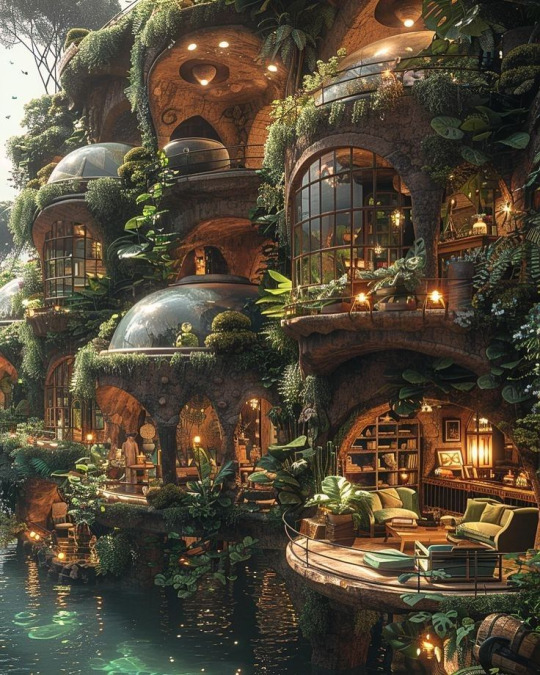

In the rural desert areas of Nirin, adobe buildings dominate the landscape. These structures are built from locally sourced clay and straw, which provide excellent natural insulation. Adobe allows for cooler interiors during the scorching summer heat and warmth in the cooler desert nights. The buildings often have thick walls and flat roofs, offering durability against the sandstorms common in the region.
ೃ⁀➷Waterlight City Architecture:



Waterlight City, built near the majestic canyon, features architecture that harmonizes with the rugged landscape. Buildings here are designed to resemble natural forms like horns and arches, with many structures taking on organic, sweeping shapes that evoke the curves of the canyon. These structures are often constructed from local stone or adobe, further blending with the environment.
ೃ⁀➷Carved into the Canyon:



A unique feature of Waterlight City’s architecture is that some buildings are carved directly into the canyon walls. These homes and structures are shaped with smooth, flowing lines, mirroring the natural rock formations. The walls are cool, and the interiors are spacious and airy, offering spectacular views of the surrounding desert. These carved buildings not only conserve energy but also create a stunning visual contrast against the landscape, enhancing the city’s mystical aura.
ೃ⁀➷Glowing Lights and Mystical Aura:


At night, Waterlight City takes on a glowing, ethereal quality, thanks to the strategic use of glowing lights incorporated into the architecture. These lights reflect off the natural stone, giving the buildings a surreal, almost otherworldly glow that enhances the sense of magic in the air. This visual spectacle also helps create a sense of wonder and connection to nature.
*ೃ༄Housing
ೃ⁀➷Rural Housing:
In more rural regions, people live in communal dwellings built from adobe or stone. These homes are often simple in design, with a focus on practicality. Courtyards are common in these houses, providing space for growing crops or keeping animals, essential for survival in the desert. The layout of rural homes prioritizes community living, with shared spaces for socializing, cooking, and working.
ೃ⁀➷Wealthier Residences:
Wealthier residents in urban areas, especially in Waterlight City, live in more elaborate homes, often designed with open-air courtyards, rooftop gardens, and outdoor patios. The homes are designed to be comfortable in the desert heat, with water conservation systems built into their infrastructure. These homes are often two or three stories tall, featuring wide, open spaces that make use of natural ventilation and sunlight.
ೃ⁀➷Elevated Walkways and Platforms:



The city’s design incorporates elevated platforms and walkways, which connect the various levels of the canyon city. These platforms allow for easy access to the different sections of the city and provide breathtaking views of the surrounding desert landscape. They also help prevent the heat from radiating into the lower levels, making the city cooler and more comfortable to navigate.
*ೃ༄Public Spaces
ೃ⁀➷The Hanging Crescent Arena:
One of the most significant public spaces in Nirin is the Hanging Crescent Arena. This grand amphitheater hosts the Desert Games, an annual event that celebrates the region’s traditional sports and cultural performances. The arena’s design is unique, featuring tiered seating that wraps around a central open space. This architectural wonder is carved into the side of the canyon, making use of the natural rock formations while offering a dramatic backdrop for the games.
ೃ⁀➷Public Squares and Markets:

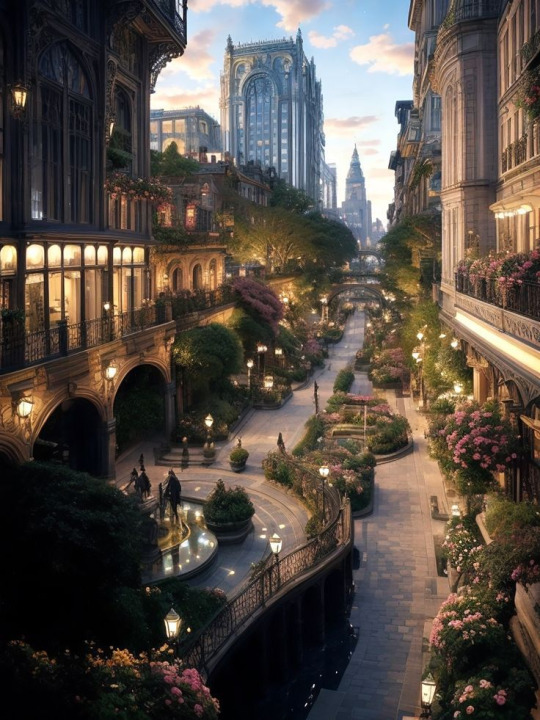

The heart of Waterlight City, and other smaller towns, are their public squares, where locals gather for commerce and social interaction. The markets are vibrant, with artisan shops offering handcrafted goods such as textiles, pottery, and jewelry. These squares often have a central fountain or gathering area, surrounded by stalls where local produce, spices, and meats are sold. The area encourages not only trade but also cultural exchange, with people coming together to share food, stories, and traditions.
ೃ⁀➷Integration with Nature:
Many of the public spaces are designed with an emphasis on merging the urban environment with the natural landscape. Green spaces, shaded courtyards, and outdoor communal areas are built with the intention of allowing residents to enjoy both the city life and the surrounding desert’s beauty. Public parks and gardens often feature native desert plants, providing a connection to the landscape while also offering respite from the heat.
*ೃ༄Transportation
ೃ⁀➷Horseback Travel:
In the rural regions of Nirin, horses are the primary mode of transportation. Their ability to traverse the desert terrain makes them invaluable for farmers, traders, and travelers. The horses are trained for endurance and can navigate both sand and rocky terrain with ease.
ೃ⁀➷Off-Road Vehicles:
For those in more remote or rugged areas, off-road vehicles are commonly used. These vehicles are specially designed to handle the harsh conditions of the desert, with large wheels and reinforced frames that can withstand sandstorms, rough roads, and extreme heat. These vehicles are often used for long-distance travel between villages or for transportation of goods.
ೃ⁀➷Canyon Trails and Transportation in Waterlight City:
In Waterlight City, the extensive network of canyon trails is used to connect different districts. These trails are well-maintained, and people often travel on foot, horseback, or by bike. The city’s design encourages walking and cycling, and the trails provide scenic views of the canyon and the surrounding desert. The trails are also used for more practical purposes, such as transporting goods and materials between districts. People can also go by boat in the waterlight city lake.



ೃ⁀➷Modern Transport:
For those seeking faster or more contemporary transportation options, sports cars and motorcycles are a common sight in Waterlight City. These vehicles are suited for the city’s wide streets and roads, often modified for speed and style. Skateboards are also used for short-distance travel, particularly among younger residents who enjoy the thrill of gliding through the urban landscape.
.ೃ࿐Cultural Differences
*ೃ༄Golden Waterlight Butterflies
The Golden Waterlight Butterflies are an iconic part of Nirin’s cultural and natural heritage. These butterflies, which hover near the shores of the Waterlight Lake, are particularly revered for their beauty and role in the region’s history.
ೃ⁀➷Symbol of Light:
In the past, before the advent of electricity, the people of Nirin used these butterflies as natural lights, placing food outside during the night to attract them. The glowing butterflies would light up the landscape, providing a soft, mystical illumination. This practice is now seen as a romantic symbol of the old ways, though many still hold the butterflies in high regard and see them as symbols of hope, guidance, and the enduring spirit of nature.
ೃ⁀➷Cultural Significance:
These butterflies are often incorporated into various cultural practices, from religious ceremonies to artistic expression. They might be featured in local dances, where performers mimic the delicate movements of the butterflies, or they might be seen in jewelry and tattoos, representing the fleeting beauty of life and nature’s ability to shine even in the darkest moments.
*ೃ༄Pets
Wealthier families in Nirin can own exotic pets such as Waterlight Lions, which are highly trained and treated with the utmost care under strict laws.
ೃ⁀➷Waterlight Lions:
Waterlight Lions are one of the most prized animals in Nirin, particularly among wealthier families. These lions are known for their regal appearance, golden fur, and piercing eyes, and they are often seen as symbols of strength and leadership. These lions are carefully trained, with only the wealthiest individuals able to afford the resources needed to care for them. Training these creatures requires a high level of skill, patience, and respect for the animal, and there are strict laws that govern their treatment to ensure they are not mistreated or exploited.
ೃ⁀➷Strict Laws:
Owning a Waterlight Lion or other exotic pets in Nirin comes with a set of regulations that must be followed. These laws ensure that the animals are treated humanely and that their natural habitats are respected. Exotic pets are often seen as a sign of high social standing, and their care requires significant financial investment, making them a symbol of the wealth and power of the family that owns them.
*ೃ༄Military
Nirin is home to one of the major military bases, emphasizing the province’s role in training and defense. Military training is a key part of Nirin's economy and culture.
ೃ⁀➷Economic Role:
The military is one of the primary economic drivers in Nirin, with many industries and sectors tied to defense. The base serves as both a training ground and a production center for military technology, including weapons and defense systems. As a result, the province has a large number of people working in military-related industries, and much of the local economy is dependent on the maintenance and expansion of these sectors.
ೃ⁀➷Patriotism and Honor:
Military service is also a deeply ingrained cultural value in Nirin. Honor, courage, and sacrifice are highly celebrated, and military parades and public ceremonies are frequent occurrences. The people of Nirin view their military as a reflection of their strength and resilience, much like the desert plants and animals that thrive in harsh conditions.
#reality shifting#reality shifter#reyaint#shiftblr#dr scrapbook#anti shifters dni#shifting community#shifting#shifting motivation#dr world
8 notes
·
View notes
Text
Thailand Board of Investment
The Thailand Board of Investment (BOI) is a pivotal government agency tasked with promoting investment in Thailand, both from domestic and foreign sources. Established in 1966, the BOI plays a crucial role in driving economic growth, fostering innovation, and enhancing Thailand's competitiveness in the global market. By offering a range of incentives, streamlined services, and strategic support, the BOI attracts high-value investments across various sectors. This article provides an in-depth exploration of the BOI, covering its legal framework, incentive schemes, application process, and strategic considerations for investors.
Legal Framework and Mission of the BOI
The BOI operates under the Investment Promotion Act B.E. 2520 (1977), which grants it the authority to provide incentives and support to qualified investments. The BOI's mission is to:
Promote Investment: Attract domestic and foreign investment in targeted industries and regions.
Enhance Competitiveness: Strengthen Thailand's position as a regional hub for trade and investment.
Foster Innovation: Support research and development (R&D), technology transfer, and sustainable practices.
Facilitate Business: Streamline regulatory processes and provide comprehensive support services to investors.
The BOI is governed by a board chaired by the Prime Minister, with members from key ministries and private sector representatives, ensuring a balanced approach to investment promotion.
Key Incentives Offered by the BOI
The BOI offers a range of incentives to attract and support investments in targeted industries. These incentives are designed to reduce costs, enhance competitiveness, and facilitate business operations. Key incentives include:
1. Tax Incentives
Corporate Income Tax (CIT) Exemptions: Projects may receive CIT exemptions for up to 8 years, with possible extensions for projects in advanced technology or R&D.
Import Duty Exemptions: Exemptions on import duties for machinery, raw materials, and components used in production.
Dividend Tax Exemptions: Dividends paid from exempted profits are also exempt from taxation.
2. Non-Tax Incentives
Land Ownership: Foreign investors may own land for promoted projects, subject to BOI approval.
Work Permits and Visas: Simplified procedures for obtaining work permits and visas for foreign executives, experts, and technicians.
Repatriation of Funds: Permission to repatriate investment capital, profits, and dividends.
3. Sector-Specific Incentives
Targeted Industries: Enhanced incentives for industries such as biotechnology, digital technology, renewable energy, and advanced manufacturing.
Special Economic Zones (SEZs): Additional incentives for investments in SEZs, including infrastructure support and reduced regulatory requirements.
4. Additional Benefits
Investment Promotion Zones: Incentives for investments in designated zones, such as the Eastern Economic Corridor (EEC).
Green Initiatives: Additional benefits for projects that promote environmental sustainability and energy efficiency.
Targeted Industries and Strategic Sectors
The BOI focuses on promoting investments in industries that align with Thailand's economic development goals. Key targeted industries include:
Advanced Technology and Innovation:
Biotechnology, nanotechnology, and advanced materials.
Digital technology, including software development, data centers, and cybersecurity.
Sustainable Industries:
Renewable energy, such as solar, wind, and biomass.
Environmental management and waste-to-energy projects.
High-Value Manufacturing:
Automotive and aerospace industries.
Electronics and electrical appliances.
Services and Infrastructure:
Tourism and hospitality, including medical tourism.
Logistics and transportation, particularly in the EEC.
Agriculture and Food Processing:
High-tech agriculture and food innovation.
Halal food production and export.
Application Process for BOI Promotion
The process of applying for BOI promotion involves several steps, each requiring careful preparation and adherence to regulatory requirements. Below is a detailed breakdown:
1. Determine Eligibility
Identify the appropriate BOI category and incentives based on your business activities and investment plans.
Ensure that your project aligns with the BOI's targeted industries and strategic goals.
2. Prepare Required Documents
Business Plan: Detailed plan outlining the project's objectives, scope, and financial projections.
Financial Statements: Audited financial statements for existing companies or pro forma financials for new ventures.
Technical Specifications: Details of machinery, technology, and production processes.
Environmental Impact Assessment (EIA): For projects with potential environmental impacts.
3. Submit the Application
Submit the application through the BOI's online portal or at a BOI office.
Pay the application fee, which varies depending on the project size and complexity.
4. Review and Approval
The BOI reviews the application, including the project's feasibility, economic impact, and compliance with regulations.
Additional information or clarifications may be requested during the review process.
5. Receive BOI Promotion Certificate
If approved, the BOI issues a Promotion Certificate, detailing the incentives and conditions.
The certificate must be registered with the relevant government agencies to activate the incentives.
6. Compliance and Reporting
BOI-promoted projects are subject to periodic reporting and compliance checks.
Ensure that all conditions and requirements are met to maintain the incentives.
Strategic Considerations for Investors
To maximize the benefits of BOI promotion, investors should consider the following strategies:
Sector Alignment:
Align your investment with the BOI's targeted industries and strategic goals.
Research the specific incentives and requirements for your sector.
Comprehensive Planning:
Develop a detailed business plan that outlines the project's objectives, scope, and financial projections.
Consider the long-term impact of the investment and potential for expansion.
Legal and Regulatory Compliance:
Ensure compliance with Thai laws and regulations, including environmental and labor standards.
Seek legal advice to navigate the complexities of BOI promotion and regulatory requirements.
Partnerships and Collaboration:
Form strategic partnerships with local businesses, research institutions, and government agencies.
Leverage local expertise and networks to enhance the project's success.
Sustainability and Innovation:
Incorporate sustainable practices and innovative technologies into the project.
Explore opportunities for R&D and technology transfer to enhance competitiveness.
Recent Developments and Trends
Thailand's investment landscape is evolving, with several trends and developments shaping the BOI's strategies:
Eastern Economic Corridor (EEC):
The EEC is a flagship initiative to develop the eastern region into a hub for advanced industries and innovation.
The BOI offers enhanced incentives for investments in the EEC, including infrastructure support and streamlined regulations.
Digital Transformation:
The BOI is promoting investments in digital technology, including artificial intelligence, blockchain, and fintech.
Digital infrastructure projects, such as data centers and smart cities, are prioritized.
Sustainability and Green Initiatives:
There is growing emphasis on sustainable investments, including renewable energy, waste management, and green manufacturing.
The BOI offers additional incentives for projects that promote environmental sustainability.
Post-Pandemic Recovery:
The BOI is implementing measures to support economic recovery, including incentives for healthcare, biotechnology, and supply chain resilience.
Efforts to attract foreign investment and boost domestic industries are intensified.
Conclusion
The Thailand Board of Investment (BOI) is a vital institution for promoting investment and driving economic growth in Thailand. By offering a range of incentives, streamlined services, and strategic support, the BOI attracts high-value investments across various sectors. Understanding the BOI's legal framework, incentive schemes, and application process is essential for investors seeking to capitalize on the opportunities in Thailand. As the country continues to evolve its investment landscape, staying informed and proactive will remain key to achieving long-term success. Whether you are a domestic entrepreneur or a foreign investor, the BOI provides a robust platform for realizing your investment goals and contributing to Thailand's economic development.
#thailand#thai#corporate#thailandboardofinvestment#thailandboi#thaiboi#boi#boardofinvestment#corporateinthailand#businessinthailand#business
4 notes
·
View notes
Text
"They never taught us x in school" is sometimes a criticism of your school's biases or specific teachers being trash, but I think a lot of it comes down to the fact that kids have each subject once or twice a week, and learn at a high school level. You didn't get to learn a comprehensive history of your country's politics and culture because there wasn't enough time in between learning every other subject and doing all your extracurricular projects and learning how to write essays better than a toddler. And christknows kids barely do homework let alone read their textbooks cover to cover to see what they missed in class.
The point of school wasn't to teach you specifics about every topic on earth, that was never possible. It was making kids literate and setting them up for their future.
Back when kids were just taught to memorise flags and country names, schools caught flak for not teaching them about the culture and politics of those places ('facts instead of knowledge'). Now, when they DO teach you about a couple of countries' cultures and histories in more depth, people complain that it's too specific, or that those aren't the right country or time in history to learn about. You see the problem? The VASTNESS of planet earth and all of relevant human history? The generalised skills are the most useful ones, and I promise you they taught you those at school, even if they didn't give you a checklist of everything you would need to know to become ~informed about the world~. And now people are pointing out that students can't name every place on the globe, when that was never a skill anybody has ever used in their lives. (Psst -- globes and maps exist.)
Look through your old schoolbooks. They taught you how to analyse souces in history, and learning about WW2 or whatever was just a way to do that. In English, you learned how to recognise persuasive writing and how to do it yourself, probably by analysing everything from newspapers to poems. You were taught about other cultures and peoples in their respective language classes, you studied at least one. You might have learned about the impacts of tourism and climate change in geography and all the things we're doing to balance them. In chemistry and physics you learned about practical experiments and how they relate to real life phenomena that affect us daily. Food tech/woodworking/graphic design/resistant materials taught you about the design and production of new market products. You probably even learned the rules of the road as a bicyclist and pedestrian at school. School taught you about diseases and vaccines and handwashing, they taught you how to LOOK UP INFORMATION in libraries and how to format sources, and if you're on the younger end, they taught you how to use Google and probably made you get an email address when you didn't see the point of them.
If you were never taught skills, then I'm sorry. But half the point of school is teaching kids how to CONTINUE learning their whole lives. It's not to catch them up on everything that happened in the world by age 18. If you had to know everything important by the time you graduated, you'd never have left.
#“i didn't learn about the black panthers” neither did i. but we both know about them.#my highschool was a good one and it still didn't teach every student everything#for example only the A class learned german and the B class did spanish. only the A class learned about the Tsar Nicolas#only the b class did graphic design and we got stuck with woodworking#schooling#history#education
8 notes
·
View notes
Note
https://fortune.com/europe/2024/07/09/mayor-of-athens-overtourism-greece-not-viable-visitor-tourism-economy/
Nothing new but the Greek government should really invest on other aspects except from tourism. Like yes it's profitable but it can't be the only source of income alongside with agriculture.
OH MY GOD yes! Kudos to Haris Dukas for saying this, I suppose it's still a very unpopular and brave opinion among the politicians, who are known to care only for the short-term non-viable benefits.
I have a lot of feelings and thoughts regarding overtourism, given that I started this blog exactly because I am interested in the tourist industry, in touristic promotion in general.
A few days ago I scrolled through an article which was saying that some smaller country in Europe is getting more and more tourists and aspires to reach Greece's numbers by also competing with us over our tourists for a similar tourist product (beaches and sun) and there was this tinge of annoyance I felt because it's a cool country and I have been there but I have an opinion on this, so I was like somewhere between "bitch please" and "why, are we doing something wrong?". I mean, I wish the best for them but the annoyance was about kind of targeting tourists interested in Greece with cheaper offers and also because I am interested in this, the travel promotion of Greece, even as a hobby, so you know it sort of affects me, lol . But as I was scrolling down the article, I saw the other Greek comments and they were like "Good, let them go there and leave us in peace".
This gave me such a pause. It was one of the few times I found the comments shaking me towards their direction instead of making me angry or sad. I paused and thought, shit, they are actually right.
Let's be real, Greece does suffer from overtourism. Not only this but its overtourism is very disproportionately distributed in the country. Greece's travel product is also badly, old-fashionedly promoted (still the sun-and-beaches of the 70s which was only targeting Northern Europeans). All these create those masses of tourists following blindly the horrible itineraries of poorly informed, outdated travel agencies. Half of these people have no idea why they are coming and what they are supposed to be seeing and doing in every place.
I will go back to the notorious example of "Santorini is overrated and Greece has no trees" that you will hear a few of them say. You have people boarding a plane from the other side of the world to visit and stay on a half-submerged volcano crater and they are wondering where the forests are! People really have no idea where they are going and what for. Now this is a type of tourism we resolutely do not need. If you have to explain to someone what Santorini is AFTER they have gone there, everything was entirely lost on them, it was doomed from the beginning.
One of the most maddening videos I have ever watched was an American woman doing a travel video. She followed the AmericanTM tourist plan: she found a resort and just stayed there locked until the day of her return came. She also had just become a mother and she was dragging the baby in a different continent, only to walk it around the resort over and over. For some reason she made a youtube video for this. She didn't say anything negative but obviously if I knew nothing about Greece and I watched this, I would be like "wow what a boring place Greece is, you can't go anywhere, it's just a resort and a small market nearby". Is there really a need to overbuild the country with such massive resorts only to accommodate people who have no idea why they are coming and what they are supposed to do once they come?
Ultimately, tourism must NEVER be the main product of a country's economy. NEVER. It is very unsteady, unreliable business and when it starts doing too good, it means it will very soon ruin the country. The tourism industry must always remain steady, balanced and viable. There should be a predetermined viable percentage of area and investment that should be dedicated to tourism in every region and NEVER surpass those limits. In short, tourism should be only a side business for a country's economy and not the main thing. Even as a side thing it can become destructive. Look at how the Spanish and the Italians have started taking wild measures against tourism. There are literally protests in Barcelona with people asking tourists to leave to their face. We don't have this in Greece yet because for us it is our main industry so we still prioritise the financial need but it will soon happen here as well.
There is urgency to boost the first and especially the dead second sector in Greece. There is just no other solution. There is no light in the end of the tunnel. The first sector should not expand a lot (because its shrinkage the last decades led to the improvement of the once overexploited ecosystems, we do not want to undo this) but we should boost our produce's quality and its prestige in exports. Is there any Greek who hasn't discussed with their family that the local produce often tasted better than the imported one? Literally all of us. Greece can not produce in quantities but it can produce in quality. One example, I don't know if you know it; Greece sells olive oil to Italy and Italy rebrands it as Italian olive oil (which so far is more well known worldwide) and exports it internationally. This is an agreement between the two countries from which Greece gets fast and sure money and Italy covers deficits in the quantities required by its importers. All is well but Greece is once again getting the short end of the stick, because in the long term consumers who buy this olive oil and like it will form an affinity for what they think is the Italian olive oil and not the Greek one. Greece loses from the prestige it could perhaps have gained and it loses the chance to sell Greek olive oil more competitively for what it really is. Like, every choice we do as a state is a shot in our face. I don't know how we do it. It's a talent.
(BTW no bad feels to Italian friends, this is only critical of the Greek exporters' choices, both Greek and Italian olive oil rock but I am sure if the roles were switched and Italian olive oil was sold internationally as Greek, you would too maybe feel a little awkward about it.)
I won't even go to the second sector, I won't even go there. I will just say, whoever had PITSOS electric devices in their house in the early 90s ... is probably still having the very same devices right now as we speak. I know my parents do. PITSOS devices are what we call in Greek "bad dogs". They just don't ever break. At least not in the first 30 years of usage. Fortunately PITSOS re-opened but it will take ages for them to regain all the lost ground and even try to compete now with the foreign brands, even on a local level. And they have been so ruined that I can't tell their new products will be of an equal quality as the old ones. Greece had a lot of industries. It even had good fashion industries. It's crazy that it was much better self-sustained pre-EU. By the way, I am not blaming the EU or the tourists above. No, I am blaming the Greeks for getting worse and worse and worse at managing themselves.
Should I go to the merchant navy? Let's have a laugh. Greece is still miraculously the world leader in merchant navy with Greeks owning the 25% of commercial ships in the world. Of course, a few decades ago it was the 50% but we would certainly do our best to lose that. The problem is that most of the tycoons have left the country and have their bases in the UK and other countries due to a better tax system and they sail under different flags. The funny thing is that I was reading some articles and the president of the Greek tycoons was saying that they come constantly in contact with the Greek state to discuss all this, there is interest on their side to come back, to work things out but it's always to no avail. At this point, even the TYCOONS can't work in Greece!!! XD Top that. By the way, I am not concerned about how the ship owners will get by, trust me, but these businesses are always two-way relations. Imagine all the bases, all the shipyards, all the ship making, all the jobs in ship making and in the commercial navy. Imagine owning 25% of world's ships and NOT being an international leader in shipmaking. Plus, Greeks have historically and traditionally been seafarers, this is a quality of ours we should keep cultivating, even as part of our heritage, even for the heck of it.
We have destroyed all this and have thrown all our efforts to a badly planned, unstructured mass tourism. We are running towards self-destruction head first in every possible way. There are so many foreigners who are totally sold on the stereotype "Greece has no economy, never made anything". It wasn't like that. We had and still have fine produce. This is why Greek food is considered tasty. It's not having super complex, surprising recipes. It's the quality of the produce that makes Greek cuisine famed for being both tasty and healthy. We used to have good or at least very decent industries. I think apart from cars we were pretty self-sustained on most other things. And we used to have balanced, healthy tourism with travellers who knew why they came and they often came back again and again and even stayed for life after pension because they knew why they did it.
So, I am not against tourism, I will never be but it needs to become quality tourism again and a SIDE thing for us as well. When I say quality tourism, I do not mean luxe / expensive tourism because I hate the idea of a place being inaccessible to someone who truly desires to visit it, unless they are a millionaire (let alone that luxe tourism would also stop locals from travelling inland, which already is happening) but tourism needs to become intentional again. Meaning, a tourist should be a traveller, an explorer. They should understand what they come for and take their time to explore the country properly, with respect and genuine well-meaning interest to the best of their ability. By the way, this should apply for every country. And this is honestly the safest way you can have an authentically good experience in a new country.
As for those smaller countries which try to reach Greece's numbers, well, good luck for the five years until your country gets utterly ruined.
#greece#tourism#overtourism#travel#economy#greek facts#opinion#finances#anon#mail#link#boy am i passionate about this#long text#tw long#tw long post
14 notes
·
View notes
Text
Thrifted Treasures: LJ's Journey in Sustainable Fashion Entrepreneurship
by Jerraine Sy and Jose Carlos Morata
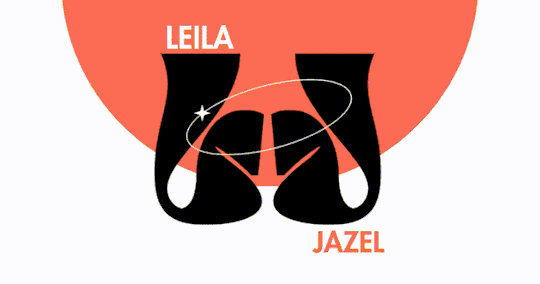
Leila Jazel Madelar, who goes by the name LJ, is a student at National University Fairview pursuing BS Tourism. LJ is the proud owner of Madie's Wardrobe, where she sells curated thrifted clothes through her Facebook page and ships them out via Shopee Checkout. LJ's commitment to sustainability and supporting local businesses is an appropriate match for our theme, which emphasizes the advantages that thrifted clothing has for the economy and the environment.
In the vibrant world of ukay-ukay, LJ encountered unpredictable situations as an entrepreneur. This is not new to the business world, especially in the ukay-ukay culture. Although she handpicked these items rather than buying in bulk, sometimes they do not appeal to people's tastes or align with current trends. The importance of adaptability in overcoming obstacles is truly essential, as mismanaging this aspect could result in profit loss.
She discusses the diverse attitudes of customers and the challenges in ensuring they follow instructions. Despite that, she employs patience and takes the time to educate customers on the checkout process, maintaining a high level of customer satisfaction. True success lies in maximizing profitability. When she receives the profit, it marks the culmination of her efforts as a dedicated businesswoman.
LJ sets herself apart by focusing on offering affordable sets, steering away from the trend of overpricing items observed in similar shops. This strategy has contributed to the success of Madie's Wardrobe. She handpicks each item from various thrift stores, personally fitting them and curating a collection through meticulous examination. This attention to detail ensures a curated and quality inventory. She observes the thrift clothes market trends and notes the enduring popularity of items like crop tops and pants. She also stays attuned to customer preferences, adapting her inventory to meet the ongoing demands of the market.
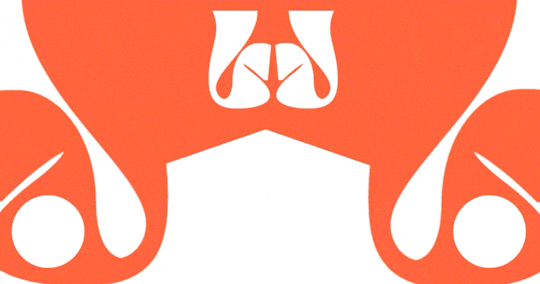
The virtue of patience is the most significant lesson that she teaches. Managing several projects at once is part of being a lone owner, and even with diligent attention to detail, problems can still occur. Maintaining a high standard of customer satisfaction requires flexibility and responsiveness to any issues that might arise. LJ advises aspiring thrift clothes sellers to embrace hard work and be prepared to take risks. She emphasizes the importance of having a backup plan to avoid losses and ensure success. Aspiring thrift store vendors should accept hard labor and be willing to take calculated chances, according to Leila. She strongly expresses that to prevent losses and guarantee success, a backup plan is essential. The importance of preparedness for potential challenges cannot be overstated; it forms the backbone of a resilient business strategy. It's important to have a backup plan within a backup plan, as this provides greater control in uncertain situations.
To sum up, LJ's experience selling used clothing is proof of her tenacity, enthusiasm, and steadfast dedication to her clients' needs. Madie's Wardrobe is a source of inspiration for aspiring businesses that want to enter the realm of online thrifted clothes sales in addition to providing reasonably priced apparel.
16 notes
·
View notes
Text

New SpaceTime out Friday
SpaceTime 20240906 Series 27 Episode 108
How NASA changed an asteroid’s orbit
A new study has confirmed that NASA’s DART impactor permanently changed the shape and orbit of the asteroid moon Dimorphos.
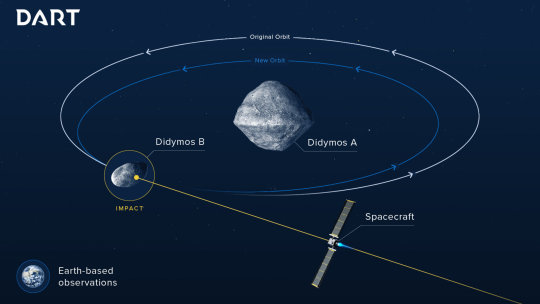
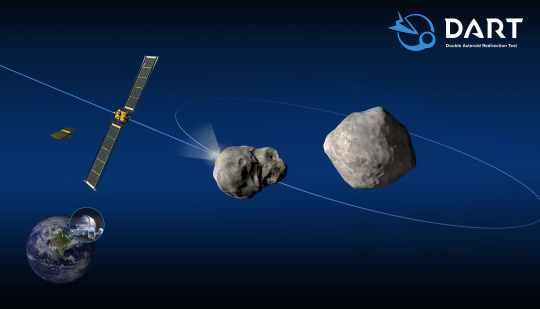
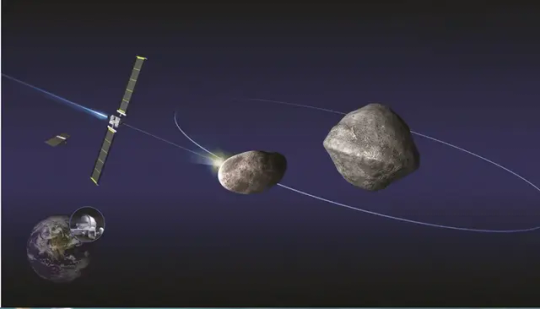
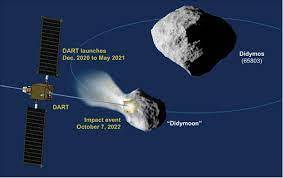
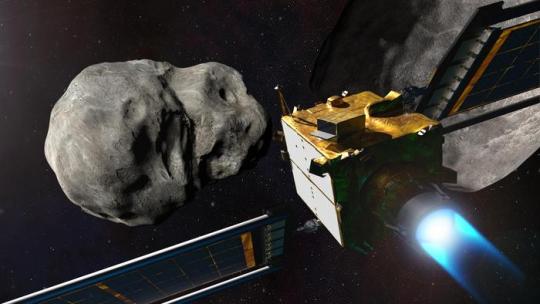
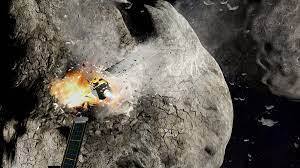
Construction continues on the new Lunar Gateway Space Station
Humanity's first lunar space station is continuing to take shape with assembly and testing of its core elements, the Power and Propulsion Element module and Habitation and Logistics Outpost module well underway.
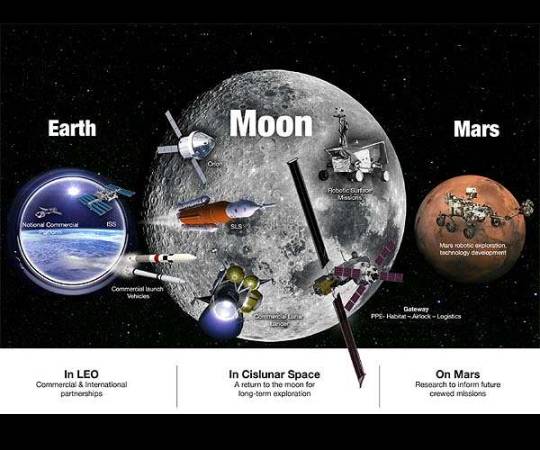


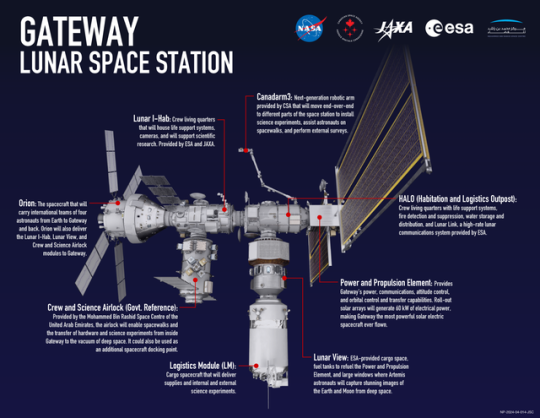
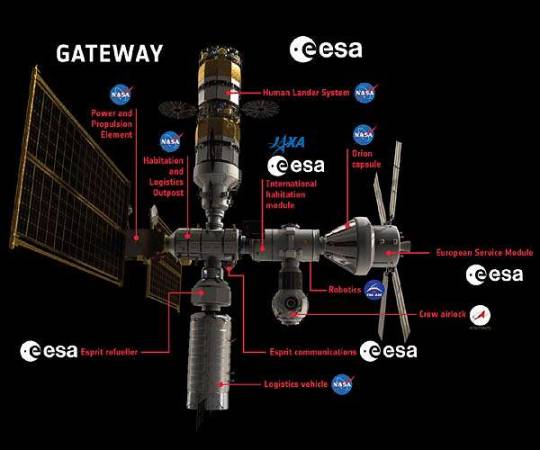

Success for Blue Origin’s eighth space tourism mission
Blue Origin has successfully flown another six space tourists into the ultimate frontier.
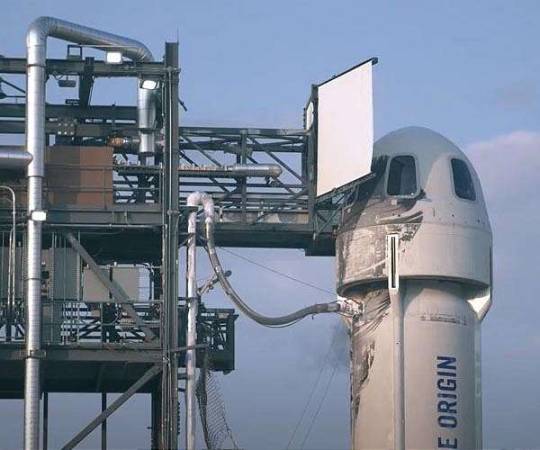

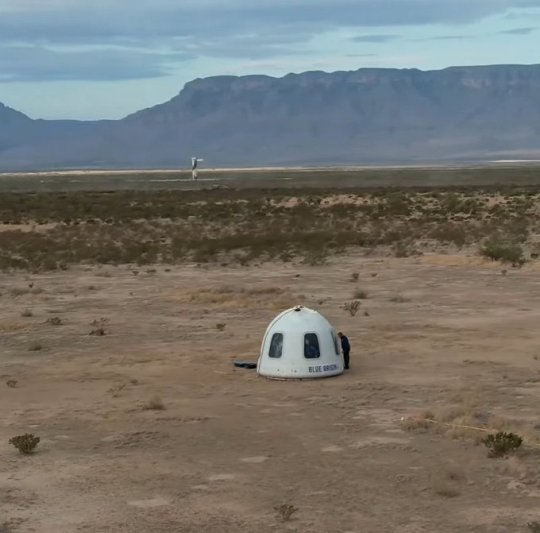
September Skywatch
The September equinox, the powerful Cygnus X1 X-ray source, and the Aurigids and Epsilon Perseids meteor showers are among the highlights of the September night skies on Skywatch.
SpaceTime covers the latest news in astronomy & space sciences.
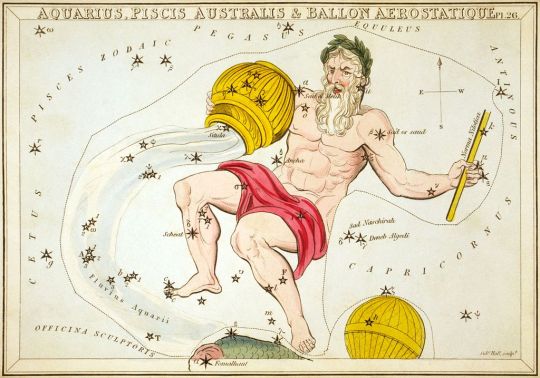









The show is available every Monday, Wednesday and Friday through Apple Podcasts (itunes), Stitcher, Google Podcast, Pocketcasts, SoundCloud, Bitez.com, YouTube, your favourite podcast download provider, and from www.spacetimewithstuartgary.com
SpaceTime is also broadcast through the National Science Foundation on Science Zone Radio and on both i-heart Radio and Tune-In Radio.
SpaceTime daily news blog: http://spacetimewithstuartgary.tumblr.com/
SpaceTime facebook: www.facebook.com/spacetimewithstuartgary
SpaceTime Instagram @spacetimewithstuartgary
SpaceTime twitter feed @stuartgary
SpaceTime YouTube: @SpaceTimewithStuartGary
SpaceTime -- A brief history
SpaceTime is Australia’s most popular and respected astronomy and space science news program – averaging over two million downloads every year. We’re also number five in the United States. The show reports on the latest stories and discoveries making news in astronomy, space flight, and science. SpaceTime features weekly interviews with leading Australian scientists about their research. The show began life in 1995 as ‘StarStuff’ on the Australian Broadcasting Corporation’s (ABC) NewsRadio network. Award winning investigative reporter Stuart Gary created the program during more than fifteen years as NewsRadio’s evening anchor and Science Editor. Gary’s always loved science. He studied astronomy at university and was invited to undertake a PHD in astrophysics, but instead focused on his career in journalism and radio broadcasting. Gary’s radio career stretches back some 34 years including 26 at the ABC. He worked as an announcer and music DJ in commercial radio, before becoming a journalist and eventually joining ABC News and Current Affairs. He was part of the team that set up ABC NewsRadio and became one of its first on air presenters. When asked to put his science background to use, Gary developed StarStuff which he wrote, produced and hosted, consistently achieving 9 per cent of the national Australian radio audience based on the ABC’s Nielsen ratings survey figures for the five major Australian metro markets: Sydney, Melbourne, Brisbane, Adelaide, and Perth. The StarStuff podcast was published on line by ABC Science -- achieving over 1.3 million downloads annually. However, after some 20 years, the show finally wrapped up in December 2015 following ABC funding cuts, and a redirection of available finances to increase sports and horse racing coverage. Rather than continue with the ABC, Gary resigned so that he could keep the show going independently. StarStuff was rebranded as “SpaceTime”, with the first episode being broadcast in February 2016. Over the years, SpaceTime has grown, more than doubling its former ABC audience numbers and expanding to include new segments such as the Science Report -- which provides a wrap of general science news, weekly skeptical science features, special reports looking at the latest computer and technology news, and Skywatch – which provides a monthly guide to the night skies. The show is published three times weekly (every Monday, Wednesday and Friday) and available from the United States National Science Foundation on Science Zone Radio, and through both i-heart Radio and Tune-In Radio.
#science#space#astronomy#physics#news#nasa#astrophysics#esa#spacetimewithstuartgary#starstuff#spacetime#jwst#hubble space telescope#james webb space telescope
11 notes
·
View notes
Text
Utopia K67
In his novel Blindness Jose Saramago narrate a story of a plague that affects the city so the encounters between inhabitants become increasingly frightening. The immense absurdity of the capital development of the contemporary city recalls Saramago's apocalyptic vision of the development affected by an epidemic of white blindness.
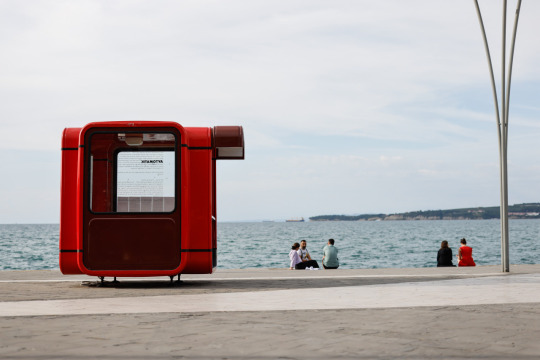
How will we live together when public spaces are sold out? The story is a parable of the fear of the unknown - is it war, isolation or just the fear of being to close to each other?
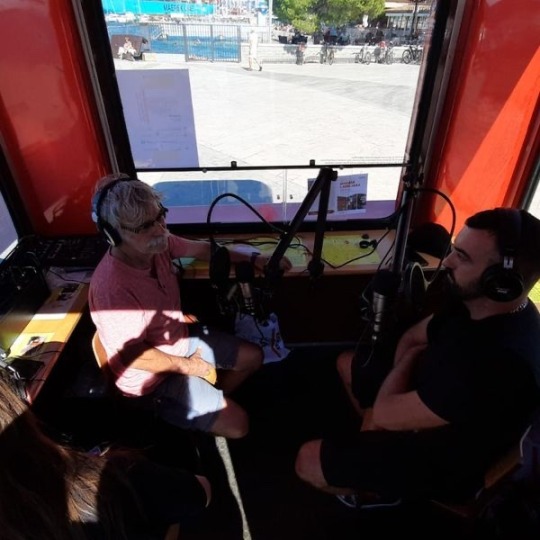
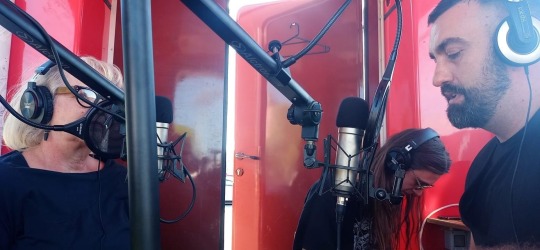
Public talks in K67 with local cultural and political figures transmitted live on-air of Independent Coastal Radio NOR.
The utopia starts in projects that are going beyond the expected rules. It points out the neuralgic problems of the location and seeks the analysis of the current state of matter. One of the utopias stands in a small Slovenian coastal town Koper - in a public square where a parking lot is situated on the most prominent position next to the sea.
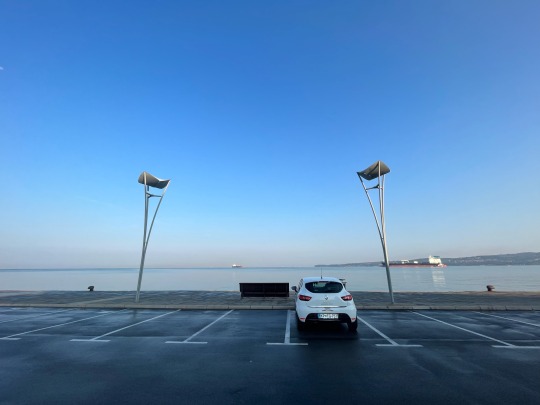
The utopia - K67 kiosk, designed by Saša Mächtig in 1967, concludes its story with the absurdity of the use of the public square next to the sea in favor of parking. As the writer and journalist Martin Reichert, to whom we dedicated this project, would say, “it is a parking lot with the most beautiful view in the world."
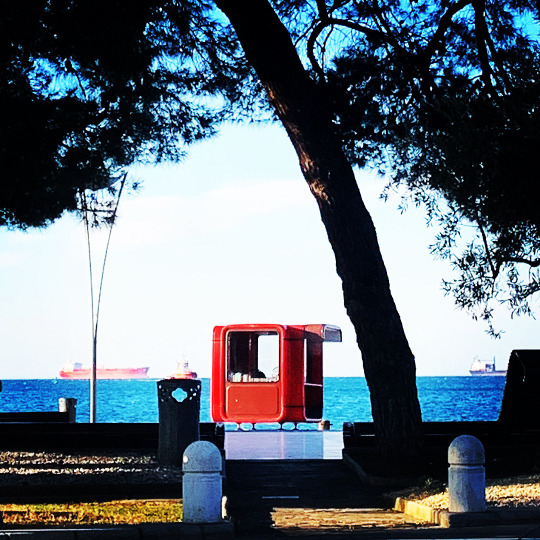
K67 is one of the best examples of design during the former Yugoslavia. In the context of the presentation in the public space, with the help of the owner Coastal Galleries Piran, it was placed on the square in Koper in December 2021, in order to become a new generator for its urban content.
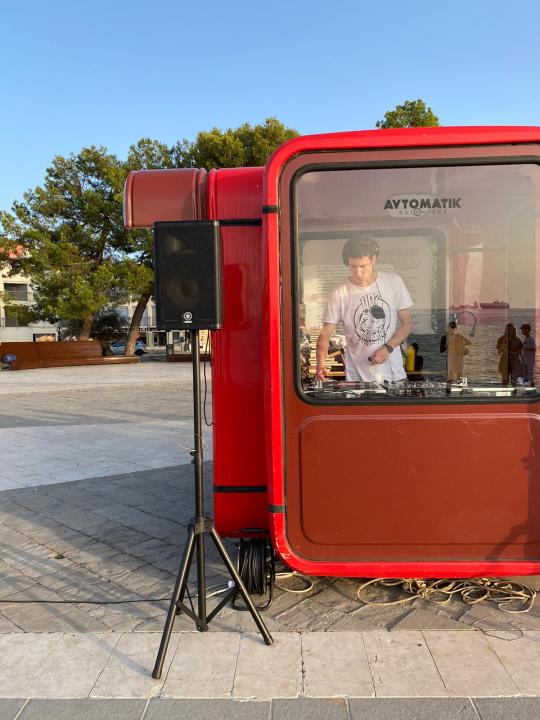
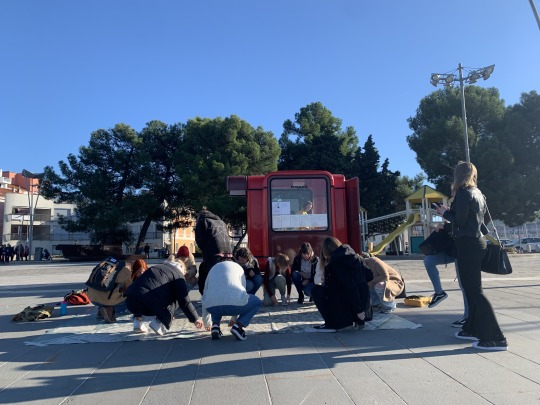
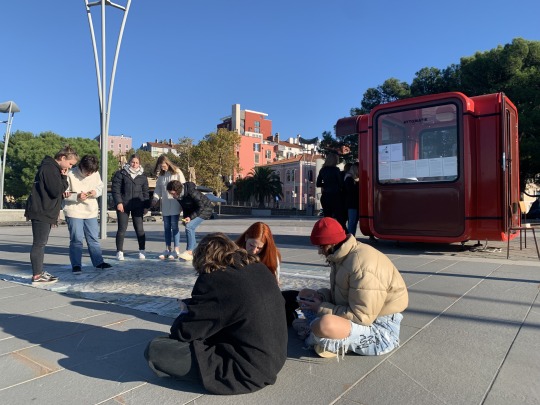
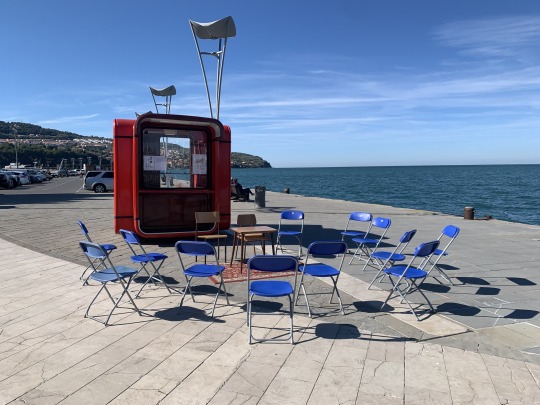
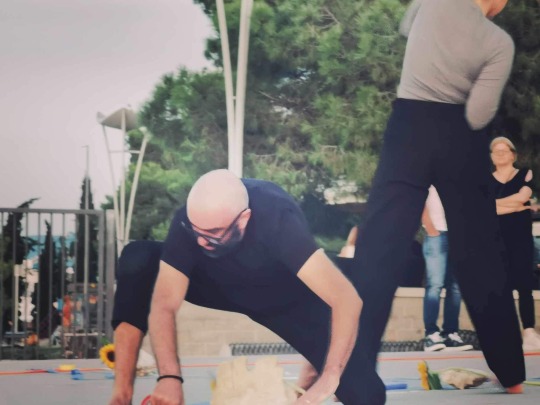
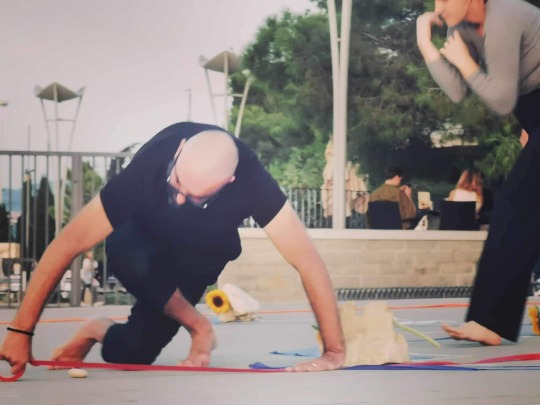
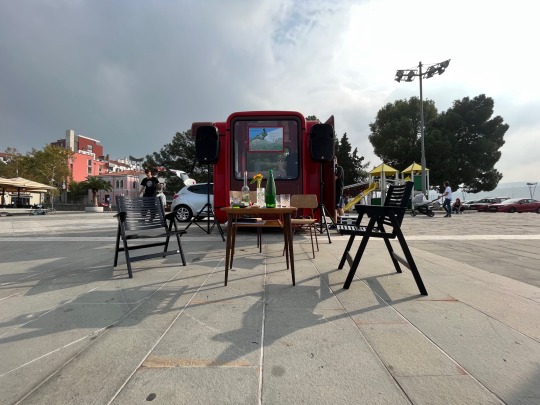
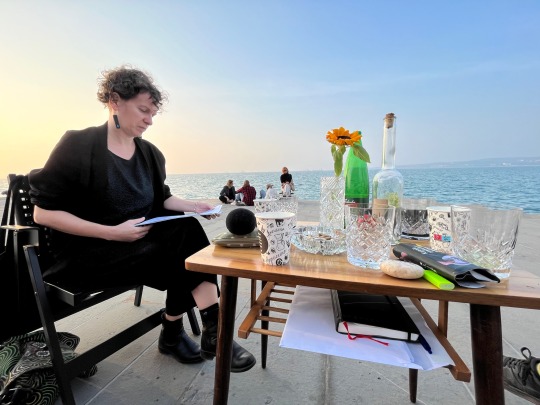
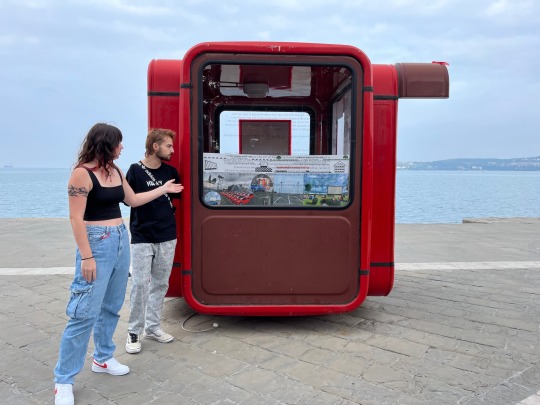
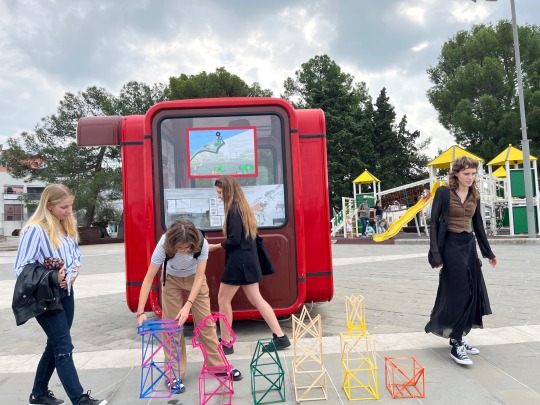
youtube
From spring to late autumn 2023, a process of tactical and performative urbanism took part in the K67 in favour to create an inclusive public space. The main concept proposed and elaborated within the municipality was based on the change of the current parking lot on the square into a green community space.
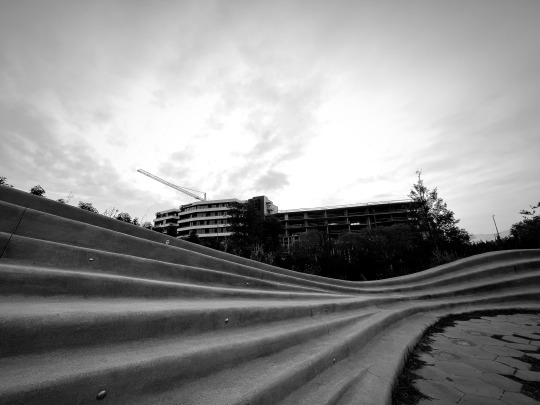
Unfinished project Solis was more than ten years a failure of a PPP concept. After COVID the investor succeeded to add two more floors of the private apartments.
Tactical urbanism is the opposite of investment urbanism, which has a dispersed structure of activity in space and builds various, mainly residential buildings that sell well, but without a well-thought-out placement in the context of the city. The last plan for Koper was signed by the architect Edo Mihevc in the 1960s.

Urban Plan for Koper, Edo Mihevc (1961). | Source © Neža Čebron Lipovec
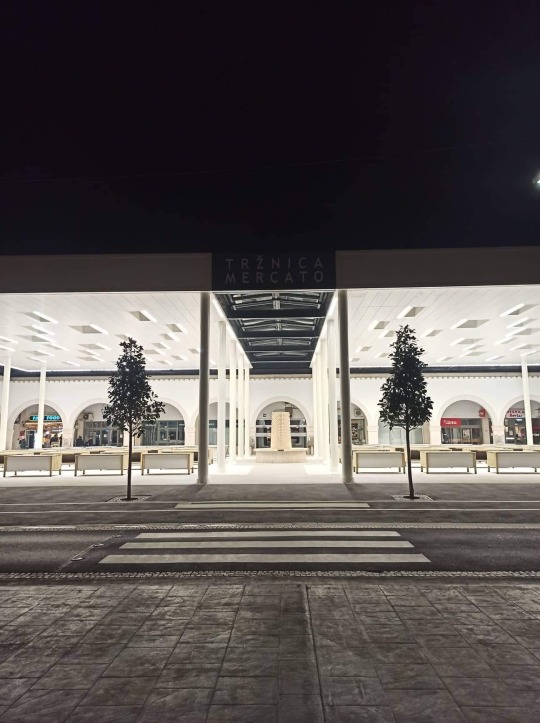
The renovation of the new roof for the city market was executed via the municipality but without a public competition.
Today it looks like investor urbanism is much faster than the concept of town planning per se. This results in a fact that there is no more urban planning in the city of Koper today.
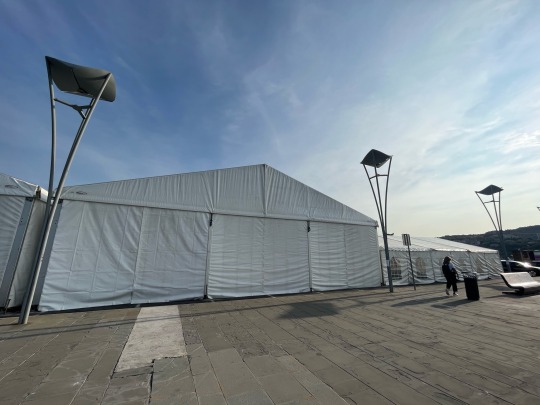
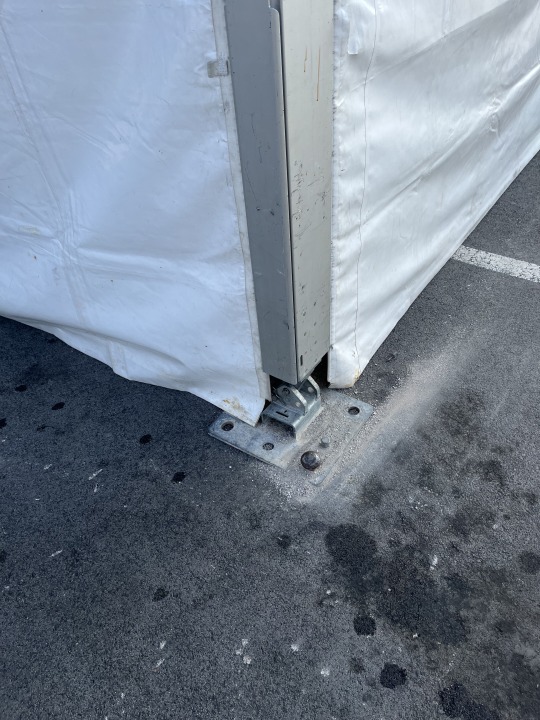
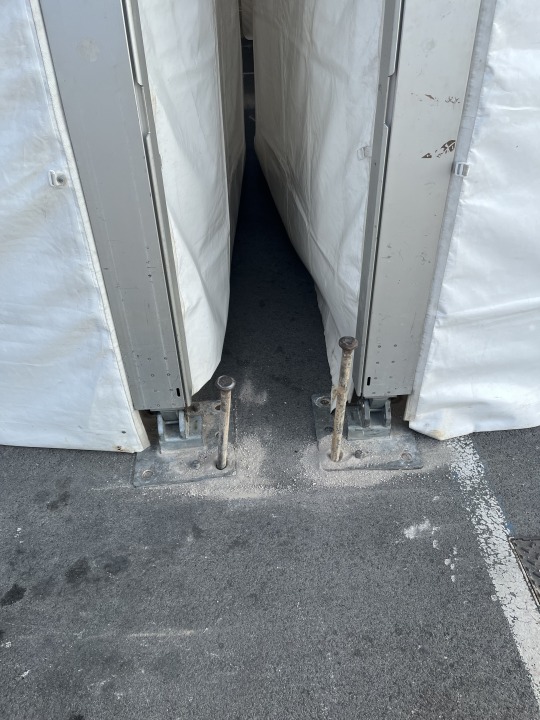
The farm market with live animals in plastic tent on Ukmarjev square shows the discrepancy of communication between the municipality and experts.
In Koper as in other towns across the Adriatic coast there is an obvious pressure from investor urbanism. Public spaces are mostly touristized, privatized and don’t belong to dwellers anymore. Therefore is important to ensure that buildings are not built without public competitions. The K67 stays a reminder of a utopia that shall make aware of the importance of reuse and creation of community spaces.
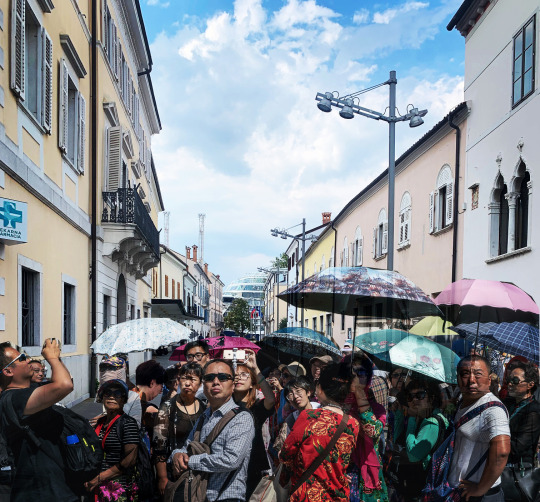
The cruise ships don't need to pay tax in Koper so instead of Venice, were are banned are welcomed for a pollution of cruise tourism.

The utopia K67 is dedicated to the writer and journalist Martin Reichert.
30 notes
·
View notes